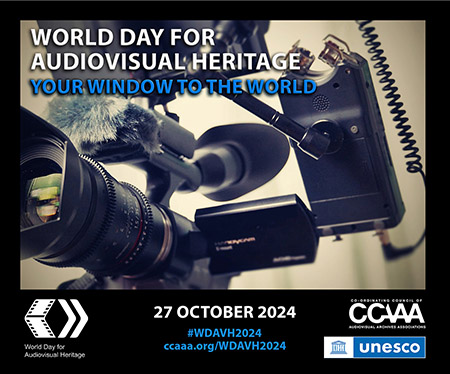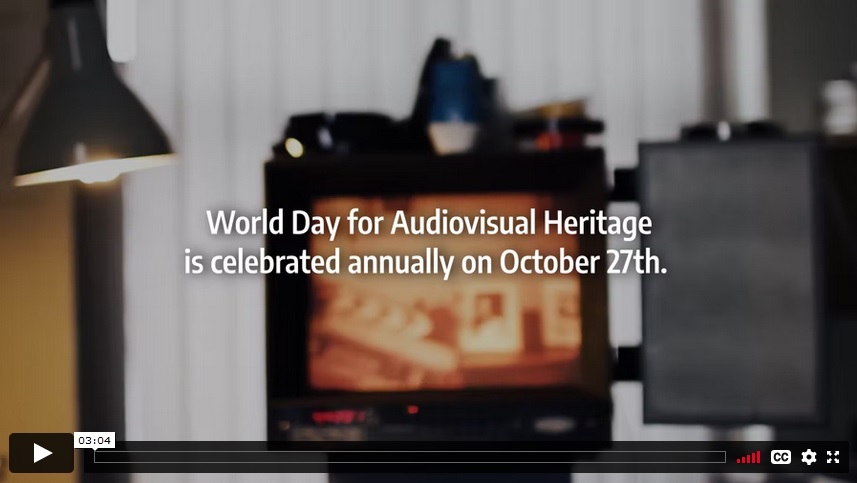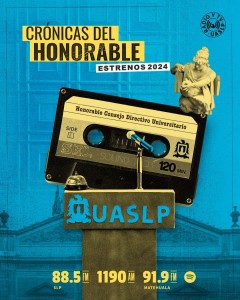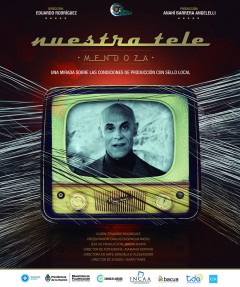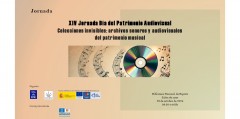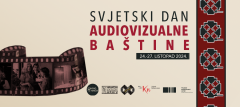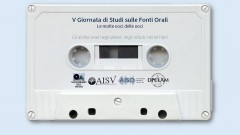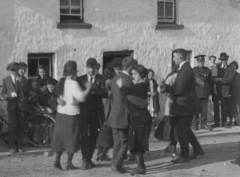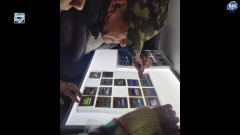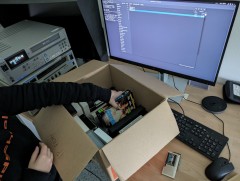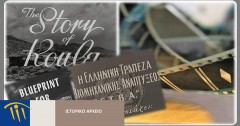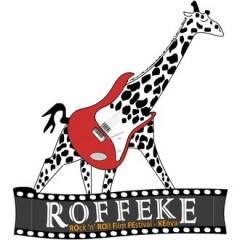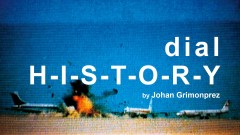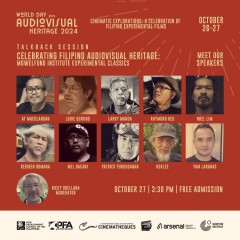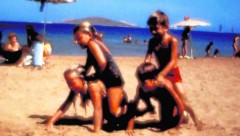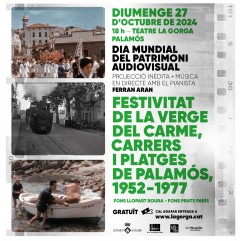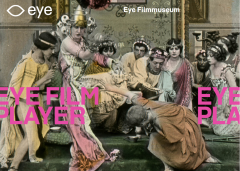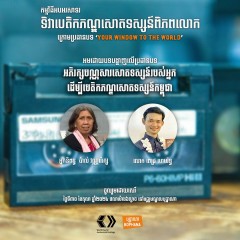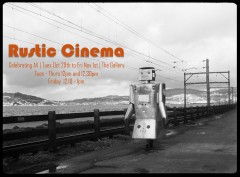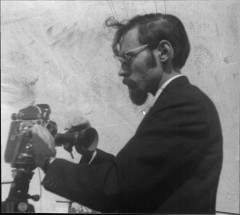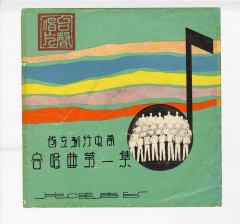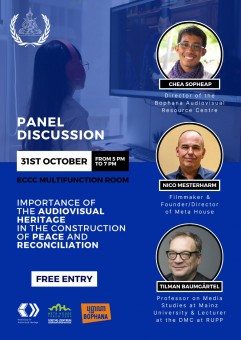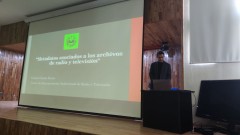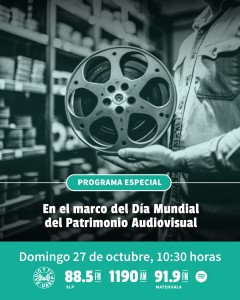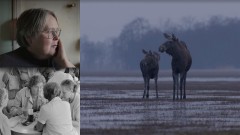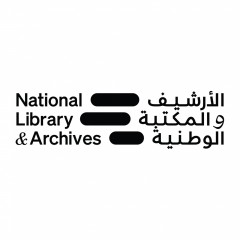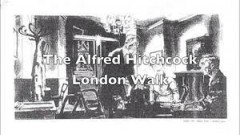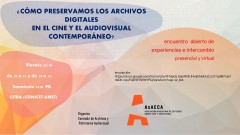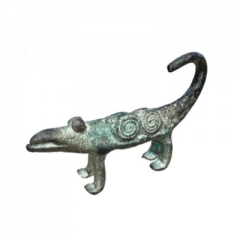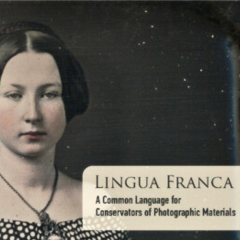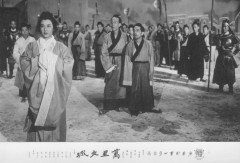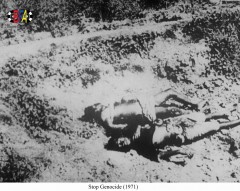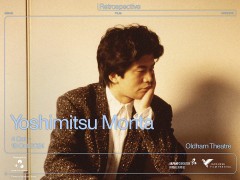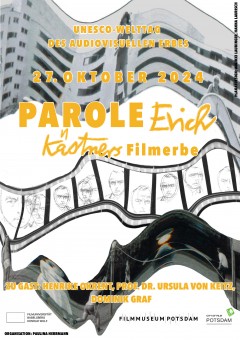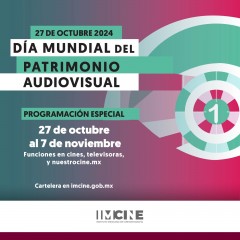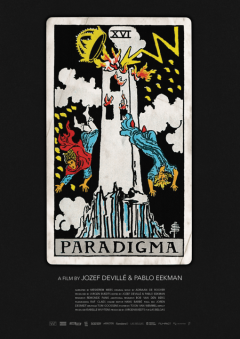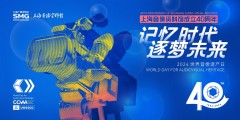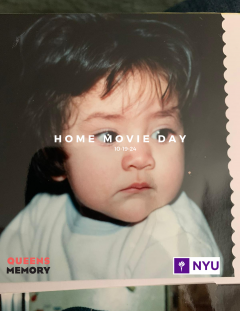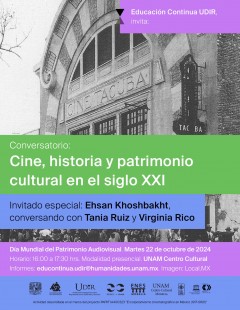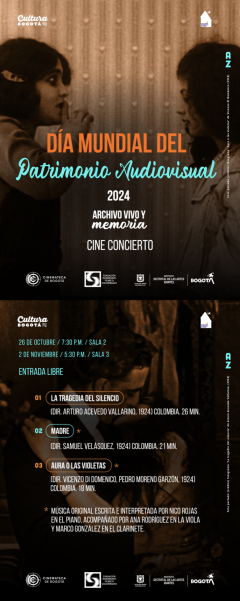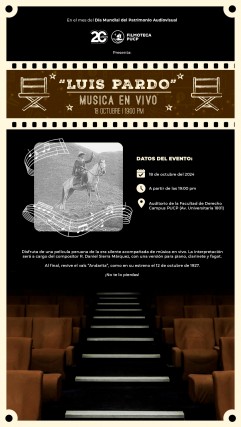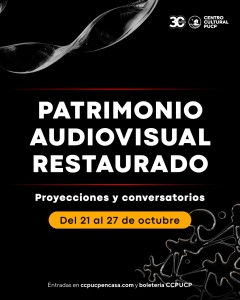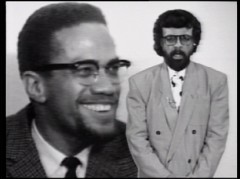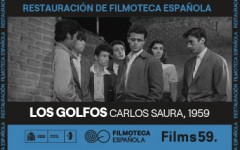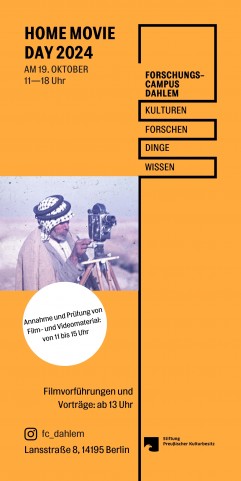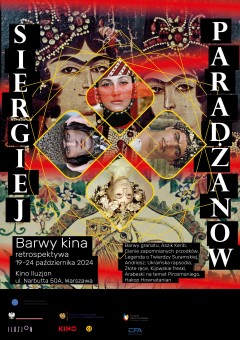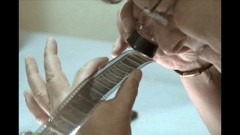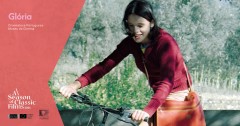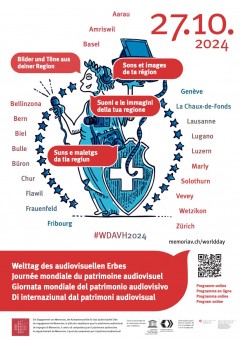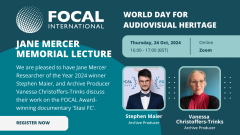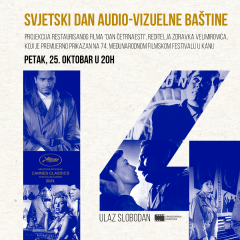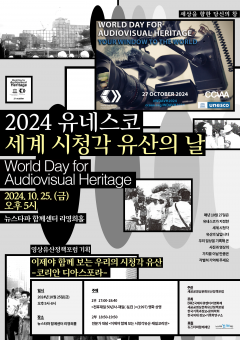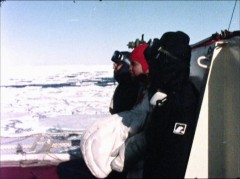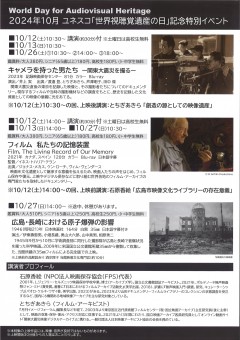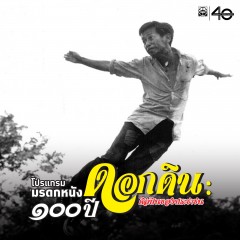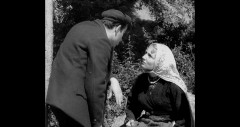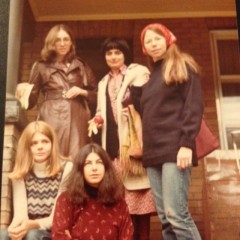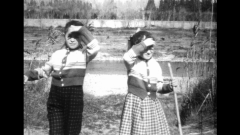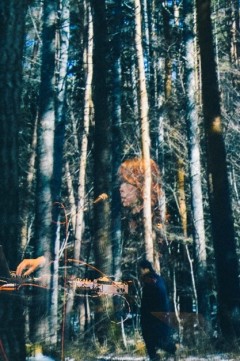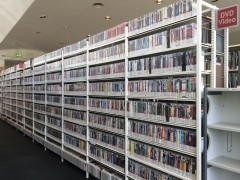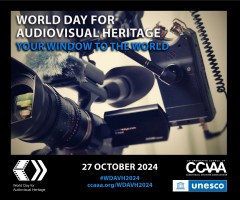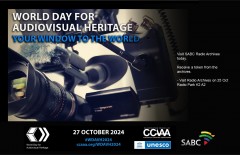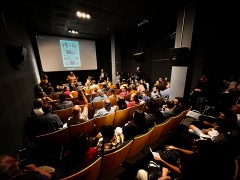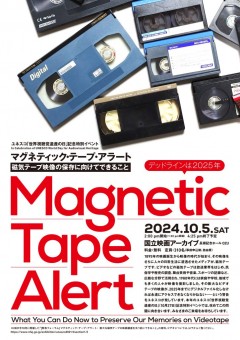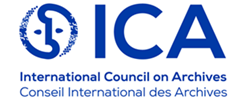2024 World Day for Audiovisual Heritage
To share information about your own celebrations, please click on the ADD A NEW EVENT button below.
Every 27 October, audiovisual archives around the world commemorate the World Day for Audiovisual Heritage. This day is a key initiative by UNESCO and the Coordinating Council of Audiovisual Archives Associations (CCAAA) to celebrate the work of archives while raising awareness of the importance and urgency of protecting audiovisual materials that will become lost if preservation is not taken or maintained.
Moving documentary heritage is an accessible storytelling that opens a window to the world. Generations of content producers derive inspiration and audiences can understand and appreciate the collective stories of beautiful imaginations, magical oral and aural recordings that travel across oceans and land, and fantastical creations that transfix sight and sound. They capture the depth, variety and rich inspiration of the human vision, ingenuity, and diversity.
Be part of this preservation movement. Feel free to use the poster and video on this dedicated webpage for reaching out to different communities. Share about the events you are organising on and around 27 October, so that people around the world can join you to be creatively spurred and motivated by the varied experiences.
Karen Chan, Chair of the CCAAA
Download, use, and share this year's poster:
Arabic version
Should you require one of the 2024 World Day for Audiovisual Heritage posters in another file format, or in another language, please contact info@ccaaa.org and we will try to help you.
Download, use, and share the promotional video:
You can download and share the World Day video by going to this dedicated page on the CCAAA website. You can also access it on YouTube.
You can now visualize all events of this year's World Day for Audiovisual Heritage on a dedicated world map that is updated in real time. You can also visualize all the notices ever posted about events celebrating the World Day for Audiovisual Heritage on the CCAAA website since the 2016 edition, on this webpage.
Share the news of your World Day celebrations:
The nine associations forming the CCAAA (AMIA, ARSC, FIAF, FIAT-IFTA, FOCAL International, IASA, ICA, SEAPAVAA, IFLA) strongly encourage all their members (and any other institutions) not only to join in the global celebrations of the 2024 World Day on and around 27 October, but also to share the information about their particular events, by clicking on "ADD AN EVENT" below and filling in the quick-and-easy form. Your descriptive text can be in the language of your choice (or even better... in several languages), but we ask you to limit it to 500 words max. You can also attach one image per event. Please fill in and submit one form per event. Your contributions will be automatically added to the list of Word day events at the bottom of this page (the latest added event will appear at the top of the list).
Happy 2024 World Day for Audiovisual Heritage !
2024 World Day for Audiovisual Heritage
To share information about your own celebrations, please click on the ADD A NEW EVENT button below.
Every 27 October, audiovisual archives around the world commemorate the World Day for Audiovisual Heritage. This day is a key initiative by UNESCO and the Coordinating Council of Audiovisual Archives Associations (CCAAA) to celebrate the work of archives while raising awareness of the importance and urgency of protecting audiovisual materials that will become lost if preservation is not taken or maintained.
Moving documentary heritage is an accessible storytelling that opens a window to the world. Generations of content producers derive inspiration and audiences can understand and appreciate the collective stories of beautiful imaginations, magical oral and aural recordings that travel across oceans and land, and fantastical creations that transfix sight and sound. They capture the depth, variety and rich inspiration of the human vision, ingenuity, and diversity.
Be part of this preservation movement. Feel free to use the poster and video on this dedicated webpage for reaching out to different communities. Share about the events you are organising on and around 27 October, so that people around the world can join you to be creatively spurred and motivated by the varied experiences.
Karen Chan, Chair of the CCAAA
Download, use, and share this year's poster:
Arabic version
Should you require one of the 2024 World Day for Audiovisual Heritage posters in another file format, or in another language, please contact info@ccaaa.org and we will try to help you.
Download, use, and share the promotional video:
You can download and share the World Day video by going to this dedicated page on the CCAAA website. You can also access it on YouTube.
You can now visualize all events of this year's World Day for Audiovisual Heritage on a dedicated world map that is updated in real time. You can also visualize all the notices ever posted about events celebrating the World Day for Audiovisual Heritage on the CCAAA website since the 2016 edition, on this webpage.
Share the news of your World Day celebrations:
The nine associations forming the CCAAA (AMIA, ARSC, FIAF, FIAT-IFTA, FOCAL International, IASA, ICA, SEAPAVAA, IFLA) strongly encourage all their members (and any other institutions) not only to join in the global celebrations of the 2024 World Day on and around 27 October, but also to share the information about their particular events, by clicking on "ADD AN EVENT" below and filling in the quick-and-easy form. Your descriptive text can be in the language of your choice (or even better... in several languages), but we ask you to limit it to 500 words max. You can also attach one image per event. Please fill in and submit one form per event. Your contributions will be automatically added to the list of Word day events at the bottom of this page (the latest added event will appear at the top of the list).
Happy 2024 World Day for Audiovisual Heritage !
Click HERE to open a new window with a printable version of the list below.
Das Filminstitut Hannover zeigt um 12:30 Uhr einen Überraschungs-Film aus unserem Archiv. Beschäftigte und Lehrende können an diesem Tag ihre Mittagspause in den alten Kinosesseln des Filminstituts verbringen. Selbst mitgebrachte Speisen und Getränken sind willkommen. Thorsten Hoppe gibt eine kleine Einführung zum 14minütigen Kurzfilm.
Filminstitut Hannover will be showing a surprise film from our archive at 12:30 pm. Employees and teaching staff can spend their lunch break on this day in our old movie theater seats. You are welcome to bring your own food and drinks. Thorsten Hoppe will give a short introduction to the 14-minute short film.
Crónicas del honorable, es una serie de cápsulas sonoras multiplataforma del Centro de Documentación Audiovisual de la Dirección de Radio y Televisión, que contiene los audios de momentos históricos del H. Consejo Directivo Universitario. En el marco del Día Mundial del Patrimonio Audiovisual (octubre 2024), se difunden documentos sonoros de las sesiones universitarias a través de narrativas que ilustran el devenir histórico de la institución.
Basement Tapes Day provides the public with access to vintage audio playback devices so they can listen to the home recordings on open-reel tapes, cassettes, and microcassettes that have been sitting in their attics or basements for years. The annual event is staffed by volunteers from Los Angeles’ audio preservation community — archivists, engineers, collectors, restoration experts, conservators, and graduate students from UCLA’s Media Archival Studies program. Attendees can hear and publicly share their tapes, while learning about the history of recorded sound, common deterioration issues with magnetic audio formats, and how to best store and care for their collections.
Se proyectó por la pantalla del Canal Señal U, perteneciente a la Universidad Nacional de Cuyo de la provincia de Mendoza, Argentina, el documental "Nuestra tele, Mendoza" una mirada crítica a las condiciones de producción con sello local. Dicho documental ha sido realizado en el marco del Proyecto homónimo que representa el primer estudio sobre la producción televisiva local y tiene como objetivo preservar y difundir el patrimonio audiovisual de la provincia más importante del oeste argentino a través de los contenidos creados para televisión a partir de la llegada de esta en el año 1961
La crisis de la industria discográfica a partir del año 2000, derivada de la caída en la venta de discos compactos, tuvo graves consecuencias para las grabaciones de patrimonio musical en España, dado que han incrementado su marginalidad dentro del circuito comercial y han desaparecido prácticamente de los catálogos de las grandes compañías. Paradójicamente, esto ha ocurrido en un momento de eclosión de la música antigua en nuestro país, con el florecimiento de nuevos grupos de nivel internacional, la recuperación sistemática de obras olvidadas y su inclusión en los festivales y ciclos, tanto nuevos como tradicionales. En consecuencia, la proliferación de programas de recuperación musical apenas se recoge en grabaciones en soporte físico, la música se distribuye y consume principalmente en plataformas de streaming, cuyos “recomendadores” automatizados tienden a invisibilizar el sector de la música antigua española. A pesar de ellos, los distintos agentes del sector han seguido considerando imprescindible grabar y conservar el repertorio musical español, por el gran esfuerzo editorial, musical y financiero que implica su recuperación, para así trascender el carácter efímero del concierto. Esta situación ha propiciado tanto la autoedición por parte de los grupos especializados como la formación de colecciones personales o institucionales inéditas que permanecen ocultas.
Esta jornada pretende abordar la cuestión de las grabaciones sonoras y audiovisuales del patrimonio musical, para identificarlas y ponerlas en valor. Además, quiere reivindicar las instituciones de depósito que permiten su preservación y difusión, como la BNE a través de su sección de registros sonoros y audiovisuales.
Proyecto DEePMusic (ref. TED2021-131738B-I00) financiado por el Ministerio de Ciencia, Innovación y Universidades.
The World Day for Audiovisual Heritage is celebrated on October 27 worldwide to highlight the importance of nurturing and preserving anthology films as a crucial part of cultural heritage. This year’s World Day for Audiovisual Heritage program took place from October 24 to 27 in 31 towns across Croatia, organized by the Independent Cinema Network and the Croatian State Archives. It featured four Croatian film classics: three cult films by renowned director Rajko Grlić—Kud puklo da puklo (1974), U raljama života (1984), and Za sreću je potrebno troje (1985)—along with the children's film Tajna starog tavana (1984) by director Vladimir Tadej.
The program for the World Day for Audiovisual Heritage was held in partnership with the Independent Cinema Network and the Croatian State Archives/Croatian Cinematheque, with financial support from the Kultura Nova Foundation and the Croatian Audiovisual Centre. All materials used in the program were archival assets from the Croatian State Archives collection, and all screenings were free of charge.
Step back in time to the roaring 1920s, a landmark decade in film history, producing enduring stories and silent films with expressive acting and innovative plots, while introducing transformative changes to the industry.
One of the key players in this transformation was Joseph Tykociner. His pioneering efforts to synchronize sound with film marked the dawn of the "Talkies", opening new horizons for filmmakers and viewers alike. His successful experiments laid the groundwork for the immersive experiences that cinema would offer throughout the 20th Century.
Fast forward to today, the University Library’s Media Preservation program is dedicated to preserving this rich legacy, a challenge we confront daily. We invite you to immerse you in this fascinating history and highlight the importance of preserving these early developments that continue to shape filmmaking.
Our labs have meticulously preserved Tykociner’s films, utilizing advanced tools and techniques to rescue rapidly deteriorating audiovisual media. This painstaking process ensures that future generations can appreciate the innovative spirit of the 1920s and the transformative power of cinema.
Join us in celebrating a century of cinematic progress and understand the critical role of preservation in keeping this vibrant history alive. The Library’s Media Preservation program invites you to dive into this pivotal era of film history and join us in honoring and preserving our shared cinematic heritage.
On October 28, the Arezzo campus of the University of Siena will host the fifth edition of the Oral Sources Study Day, an important event for scholars, researchers, and enthusiasts of oral history. Titled “The Many Voices of Voices. Oral Archives in Universities, Institutions, and Communities,” the event will take place from 10:30 a.m. at the Pionta campus (Viale Cittadini, 33).
Organized by the Permanent Forum for Oral Sources, this gathering will bring together experts from universities, research institutions, the Directorate-General of Archives, scientific associations, cultural groups, and independent enthusiasts. The event aims to encourage dialogue and share experiences on preserving, enhancing, and reusing oral sources for research purposes, featuring presentations on current projects and activities.
During the Study Day, Professor Silvia Calamai of the University of Siena’s Department of Philology and Literary Criticism will introduce the inaugural issue of OAr Journal, a new open-access, peer-reviewed academic journal on oral archives published by USiena Press. This initiative is supported by the PRIN ROADS project (Roads to Oral Archives Development and Sustainability), the Italian Voice Sciences Association, and the Italian Oral History Association.
More information and the program are available on the Arezzo Campus website: campusarezzo.unisi.it/2024/10/02/adarezzo5giornatastudifontiorali. For further details, contact: archiviorali@gmail.com or prin2022-progettoroads@unisi.it.
To celebrate @UNESCO #WDAVH2024, the IFI Irish Film Archive, in partnership with San Francisco Silent Film Festival, and Chicago’s Academy of Sciences, present The Benjamin Gault Collection on the IFI Archive Player. Films restored by SFSFF made in Cork and Kerry in the 1920s by the American ornithologist on his visit to Ireland.
The film was left untouched until it was rediscovered in 2011. This was initiated by Micheál Ó Mainnín from Ballyferriter whose interest in the material was sparked by tales which his grandfather recounted of Gault’s visit.
The IFI Irish Film Archive, San Francisco Silent Film Festival, and Chicago’s Academy of Sciences partnered to restore the nineteen 35mm nitrate camera negatives.
Benjamin True Gault (1858-1942) was an American conservationist and ornithologist. Gault visited counties Cork and Kerry to observe, record, and film wildlife in the mid-1920s. During 1925 and 1926, he recorded striking footage of seabirds and wildlife. He also captured the people of the Blasket Islands and Dunquin as they went about their daily lives, farming, church-going and dancing in the streets.
To celebrate UNESCO World Day for Audiovisual Heritage 2024, we are delighted to release The Benjamin Gault Collection on the IFI Archive Player. The beautifully restored footage is available to watch anywhere in the world and includes musical accompaniment by Dingle natives Aoife Granville (fiddle, flute) and Deirdre Granville (harp).
View the full collection at www.ifiarchiveplayer.ie/benjamin-gault/
BigFM Shillong, T7 Channel, and The Northeast India AV Archive (NEIAV Archive) have collaborated to emphasize the importance of an audiovisual archive and to explain the significance of celebrating World Day for Audiovisual Heritage. The video also showcases some of the work being undertaken at the NEIAV Archive.
Národní filmový archiv, Prague will celebrate World Day for Audiovisual Heritage on October 27 this year at Ji.hlava International Documentary Film Festival.
On the occasion of UNESCO World Day for Audiovisual Heritage, Národní filmový archiv, Prague presents the personal audiovisual archive from the estate of Ivan Passer, which it acquired in 2021. This unique collection contains more than 300 items—from VHS, Betacam, and U-Matic tapes to audio CDs and voice recorder tapes—offering a rare glimpse into the creative and personal life of the Czech director in the United States.
The lecture will focus on the professional methods of sorting and digitizing Passer’s estate and will provide samples from both his personal and professional materials. It will also feature unique content, such as a tribute to the legendary curator Hubert Bals, which Passer used as an opportunity to reflect on his own vision of cinema.
The presentation invites the audience to dive not only into Passer’s artistic legacy but also into the challenges associated with processing personal estates and archival work in general. Presented by Valentina Carnali and Matěj Strnad.
Με αφορμή την Παγκόσμια Ημέρα Οπτικοακουστικής Κληρονομιάς (27/10), το Πολιτιστικό Ίδρυμα Ομίλου Πειραιώς οργανώνει επιστημονική συνάντηση με τίτλο «Αναζητώντας εικόνα και ήχο», την Τρίτη 29 Οκτωβρίου 2024 (ώρα 17:30), στο κτήριο του Ιδρύματος, στον Ταύρο.
Στη συνάντηση θα χαρτογραφηθούν σύνολα οπτικοακουστικού υλικού που είναι διαθέσιμο στην Ελλάδα και θα δοθεί έμφαση στην ερευνητική, εκπαιδευτική και καλλιτεχνική αξιοποίηση της οπτικοακουστικής αυτής κληρονομιάς.
Πρόγραμμα
17:30. Κωνσταντίνα Σταματογιαννάκη, δρ Θεατρολογίας, Αρχειονόμος, Υπεύθυνη για τα αρχεία παραστατικών τεχνών στο ΕΛΙΑ/ΜΙΕΤ, «Η τέχνη είναι ουσιαστικό». Ηχητικό υλικό στα αρχεία παραστατικών τεχνών του ΕΛΙΑ/ΜΙΕΤ
17:45. Ευάγγελος Καραμανές, Διευθυντής Ερευνών, Διευθύνων το Κέντρον Ερεύνης της Ελληνικής Λαογραφίας της Ακαδημίας Αθηνών, Η Εθνική Μουσική Συλλογή και το Κινηματογραφικό Αρχείο του Κέντρου Λαογραφίας της Ακαδημίας Αθηνών: μουσικές εκδόσεις, πολυμεσικές εφαρμογές, εκπαίδευση, καλλιτεχνική δημιουργία
18:00. Βάλια Βράκα, Μουσικολόγος, Υπεύθυνη Τομέα Ελληνικής Μουσικής, Μουσική Βιβλιοθήκη «Λίλιαν Βουδούρη», Σύλλογος Οι Φίλοι της Μουσικής, Επανάχρηση οπτικοακουστικού υλικού με νέα τεχνολογικά μέσα: η περίπτωση του Οπτικοακουστικού Αρχείου Αν. Μακεδονίας-Θράκης της Μουσικής Βιβλιοθήκης «Λίλιαν Βουδούρη» του Συλλόγου Οι Φίλοι της Μουσικής
18:15. Ερωτήσεις
18:30. Μόνικα-Σταυρούλα Καραμαλάκου-Λάππα, Προϊσταμένη Διεύθυνσης Υποστήριξης Προγραμματισμού & Εκπαίδευσης για την Αειφορία - Σοφία Παπαδημητρίου, Προϊσταμένη Εκπαιδευτικής Ραδιοτηλεόρασης και Ψηφιακών Μέσων, ΥΠ.Π.Ε.ΘΑ., Καθηγήτρια–Σύμβουλος, Σχολή Ανθρωπιστικών Επιστημών, Ελληνικό Ανοικτό Πανεπιστήμιο, Αξιοποίηση οπτικοακουστικών αρχείων στο πλαίσιο της Εκπαιδευτικής Ραδιοτηλεόρασης του Υπουργείου Παιδείας
18:45. Ελένη Ζώντου, Τεκμηριώτρια πολιτιστικού αποθέματος, Αρχείο ΕΡΤ, Δημιουργική επανάχρηση του Αρχείου της ΕΡΤ από την εκπαίδευση στη μυθοπλασία
19:00. Παναγιώτης Σαβοριανάκης, ιστορικός, φιλόλογος, Σύμβουλος εκπαίδευσης Δ.Δ.Ε. Γ΄ Αθήνας, Εκπαιδευτικές κινηματογραφικές πλατφόρμες: Η αξιοποίησή τους για τη διδασκαλία της Ιστορίας και η συμβολή τους στον οπτικοακουστικό γραμματισμό των εφήβων
19:15. Ελένη Μπενέκη, Ιστορικός ΜΑ, Πολιτιστικό Ίδρυμα Ομίλου Πειραιώς, Οπτικοακουστικά τεκμήρια για την «Ιστορία από τις πηγές»
19:30. Ερωτήσεις - συζήτηση
Η συμμετοχή είναι δωρεάν. Απαραίτητη η κράτηση θέσης.
Για περισσότερες πληροφορίες και κρατήσεις μπορείτε με το Ιστορικό Αρχείο, στο τηλέφωνο 210 3418051, Δευτ.-Παρ. 10:00-16:00.
ΠΙΟΠ | Ιστορικό Αρχείο
Δωρίδος 2 & Λεωφόρος Ειρήνης 14, 17778, Ταύρος
Τ.: 210 3418051 | www.piop.gr
Notebooklm is an artificial intelligence tool that creates podcasts from uploaded documents. Mildred Achoch (founder of ROFFEKE) has been using Notebooklm to create podcasts from content posted on the ROFFEKE blog. It is hoped that this will amplify the already existing content and also increase access for people who may not be able to interact with the blog content effectively.
In the frame of SCCA-Ljubljana Archiving Praxis project, the yearly celebration of the World Day for Audiovisual Heritage is oraganised by the Slovenian Cinematheque (https://kinoteka.si/) and SCCA Ljubljana (https://www.scca-ljubljana.si/), will be hold with a two programme carte blanche presentation from the Argos centre for audiovisual arts based in Brussels, Belgium. The programmes will be presented and introduced by Katia Rossini, the head of the Argos collection. Beside a programme of short films with the title Culture is our Business, the acclaimed experimental documentary Dial H-I-S-T-O-R-Y (1997) by Johan Grimonprez will be screened.
CELEBRATE WORLD DAY FOR AUDIOVISUAL HERITAGE WITH FILIPINO EXPERIMENTAL FILMS!
El domingo 27 de octubre, a las 18.00 horas, La Filmoteca Valenciana proyecta el programa ‘Home Movie Day: Cine Doméstico Reciclado’, conformado por nueve películas de corta duración. Se trata de un programa de creaciones audiovisuales realizadas por diversos cineastas en las que las imágenes domésticas devienen en elemento protagonista de nuevas narraciones, expandiendo el horizonte al que en principio estaban destinadas y convirtiéndose en piezas de memoria colectiva.
La sesión será presentada por Salvi Vivancos, cofundador de la Red del Cinema Doméstico y creador de Memorias Celuloides, acompañado por Inma Trull, jefa de Recuperación de La Filmoteca.
Salvi Vivancos es un artista audiovisual, historiador del arte y recuperador de cine de pequeño formato en 8 mm, Super-8 y 16 mm. Su proceso creativo se encamina actualmente hacia el cine experimental expandido y se nutre principalmente de la investigación en torno a la fotografía analógica, la memoria, el archivo, el cine no narrativo y el cine doméstico.
El mismo día, a las 20.00 horas, La Filmoteca Valenciana proyecta, en colaboración con la Mostra de Cinema del Mediterrani, ‘Il cavaliere inesistente’ (1969), en una copia restaurada por Cinecittà y el Centro Sperimentale di Cinematografia – Cineteca Nazionale. Adaptación de la novela homónima de Italo Calvino. Dirigida por el cineasta, dibujante e ilustrador Pino Zac, se trata de una comedia que combina imagen real y animación.
La sesión será presentada por Eduardo Guillot, director artístico de la Mostra, y el jefe de Programación de la Filmoteca Valenciana, José Antonio Hurtado. La película se volverá a proyectar en otro pase gratuito, el lunes 28 de octubre, con motivo del Día Mundial de la Animación.
..............................
On Sunday 27 October, at 18.00, La Filmoteca Valenciana will screen the programme ‘Home Movie Day: Recycled Domestic Cinema’, made up of nine short films. This is a programme of audiovisual creations by various filmmakers in which domestic images become the protagonist of new narratives, expanding the horizon for which they were originally intended and becoming pieces of collective memory.
The session will be presented by Salvi Vivancos, co-founder of the Red del Cinema Doméstico and creator of Memorias Celuloides, accompanied by Inma Trull, head of Acquisitions and Access at La Filmoteca.
Salvi Vivancos is an audiovisual artist and art historian. He recovers films in 8mm, Super-8 and 16mm. His creative process is currently directed towards expanded experimental cinema and is mainly nourished by research into analogue photography, memory, archives, non-narrative cinema and home cinema.
On the same day, at 20.00, La Filmoteca will screen, in collaboration with the Mostra de Cinema del Mediterrani, ‘Il cavaliere inesistente’ (1969), in a copy restored by Cinecittà and the Centro Sperimentale di Cinematografia - Cineteca Nazionale. Adapted from the novel of the same name by Italo Calvino. Directed by the filmmaker, cartoonist and illustrator Pino Zac, this is a comedy that combines real image and animation.
The session will be presented by Eduardo Guillot, artistic director of the Mostra, and the head of Programming at the Filmoteca Valenciana, José Antonio Hurtado. The film will be screened again in another free screening on Monday 28 October, on the occasion of World Animation Day.
Festivitat de la Verge del Carme, carrers i platges de Palamós 1952-1977, és un documental realitzat amb pel·lícules de enregistrades per Carles Llopart Roura als anys 50 i 60 del s. XX i per Vicenç Prats Bagué als anys seixanta i setanta, cedides a l'Ajuntament. El muntatge és un recorregut per les celebracions i els paisatges de Palamós i Sant Joan des dels anys cinquanta als setanta del segle passat. L'edició ha estat a cura de Miquel Strubell i Prats, net de Vicenç Prats Bagué. Carles Llopart i Vicenç Prats eren aficionats a la fotografia i enregistraven en formats domèstics pel·lícules que ens ofereixen relats acurats de celebracions i esdeveniments populars, escenes familiars i paisatges de Palamós i Sant Joan ara molt transformats. La música que acompanya la projecció ha estat creada per Ferran Aran, pianista i compositor gironí amb més de 25 anys d'experiència en l'àmbit musical com a director i intèrpret en conjunts i orquestres d'arreu de Catalunya, i en l'àmbit nacional.
Stream worldwide and free of charge a new compilation from Eye Filmmuseum's Desmet Collection on the Eye Film Player.
The compilation The Colorful World of Cinema contains seven short films from the Desmet collection that showcase the beauty of color in early cinema, with a new score by Yael Acher "KAT" Modiano.
Eye Filmmuseum's Desmet Collection has been added to UNESCO’s Memory of the World Register since 2011. More info can be found on The Desmet file on Eyefilm.nl. Other compilations from the Desmet Collection can also be seen on the Eye Film Player.
The compilation consists of the following films:
Lily ménagère
France | 1914 | director: unknown | 7 min.
Orgie romaine
France | 1911 | director: Louis Feuillade | 9 min.
Tra le pinete di Rodi
Italy | 1912 | director: Roméo Bosetti | 4 min.
Ved Faenglets Port
Denmark | 1911 | director: August Blom | 38 min.
Le Royaume des fleurs
France | 1914 | director: Carmine Gallone | 7 min.
La Légende des ondines
France | 1914 | director: Georges Denola | 6 min.
L'Obsession d'or
France | 1906 | director: Pathé Frères | 3 min.
✨To celebrate the “World Day for Audiovisual Heritage” under the theme “Your Window to the World,” the Bophana Center will host a special event focused on the main topic: “Safeguarding Your Audiovisual Archives for Cambodia’s Audiovisual Heritage”. The event will feature three guest speakers, each presenting on the following topics:
“Your Story, Our History: The Role of Personal Archives in Shaping Cambodia's Collective Memory”,
presented by Bophana Center
“Sharing Personal Archives for Public Memories”,
presented by Writer Mrs. PAL Vannaryreak
“Archiving Your Family’s Story”,
presented by Mr. PICH Hemrith
The National Film and Sound Archive introduces Archival Obsessions, a new regular column where curators, NFSA staff and special guests share a single collection item (or constellation of related items) they’re obsessed with: new and old, long forgotten and newly discovered, mass and niche.
This will be published first on NFSA’s website and amplified through socialmedia channels.
This column will allow NFSA to share more of its collection with Australians and beyond, functioning as a perpetual nostalgia engine. Each contribution will identify various aspects of the item, including its anatomy - and taxonomy - as well as its singular delights and uniqueness. The column will also consider the item's provenance and connection to the present, and any long-term influences.
In honour of World Day for AudioVisual Heritage we're holding free lunchtime screenings of some of our favourite AV gems. We'll be screening films and videos created by the National Film Unit and other government agencies, which showcase how we saw ourselves and how we wanted the world to see us. See a dancing cow and a swimming sow, as well as a fashion show sponsored by the sheep of Aotearoa. There will be tales of Kiwi ingenuity and footage of Kiwi icons. For the sci-fi fans we have a 9ft 6” robot and an unexpected plot twist! Witness a high stakes rescue at the Wellington Firemen's School and a music loving goldfish. Discover how you've been mowing the lawn wrong all these years and the reason a three-year-old shouldn’t be left in charge of the road-marking.
Our grand finale is This Is New Zealand! The three-screen sensation that was considered one of the best films of Expo ’70. Its return home saw record crowds at cinemas and multiple sell-out sessions. A time capsule of Aotearoa of 1970, it conveys who we were, what we did, our passions and our past times. And demonstrates technologies not seen in NZ filmmaking before or since.
Screenings are free but a booking is required. Contact AV Preservation, Archives New Zealand Te Rua Mahara o te Kāwanatanga.
Sessions:
Tues: Every Animal Picture 12pm and 12.30pm
Wed: Te Whanganui a Tara 12pm and 12.30pm
Thurs: That Was NZ 12pm and 12.30pm
Fri: This Is NZ 12.10pm - 1pm.
The National Archives of France participates on WDAH 2024 by showing two of its films, to enable the public to appreciate and understand a cinematographic production belonging to the field of the State's public action. The 60,000 titles preserved are a window open to the depth, variety and richness of a wide range of inspirations: the women and men of the State, cultural and educational activities, health prevention, environmental preservation, filmed trials, the oral archives of witnesses to their time, popular education.
To be seen :
Ménagères, ménagez-vous (Housewives, pace yourselves), Objectif santé (Objective : health) by Roger Schodet, Caisse Nationale d’Assurance Maladie des Travailleurs sociaux, 1983, Film presented at the Etats généraux du Film documentaire 2024 in Lussas (France)
The film raises awareness of the importance of good posture and time management to avoid back pain, without calling into question the place of women in society.
La maison des Français, directed by Pierre Nivollet, Régie Française de Cinéma/Ministère de l'Equipement - de l'Environnement et du Cadre de Vie, 1979 Film presented at Rendez-vous de l'Histoire 2024 in Blois (France)
Commissioned as part of the “1000 days for architecture” campaign organized by the French Ministry of Equipment, under the mandate of Michel d'Ornano, this report provides an overview of social architecture projects from the 1920s to the 1970s.
Contact mav-av@culture.gouv.fr
To celebrate the World Day for Audiovisual Heritage, the Girona City Council, through the Center for Image Research and Dissemination (CRDI) and the Museum of Cinemaproposes this year a screening of two short films and a music video produced by Kinema Grup in the 1970s and 1980s, before this same association took the initiative to create the Televisiion of Girona.
Kinema Grup was a cultural association dedicated to the world of film and video, founded in 1970 by Joan Boadas i Busquets, Josep Maria Planas i Gifreu, and Joan Roura i Fernández. In its early days, its main goal was to promote cinematic art, both through the production and dissemination of films and through the organization of courses, talks, contests, and all kinds of public or private events aimed at promoting film culture. Throughout the 1970s, its members made several short films, some of which involved a significant number of collaborators from other groups, such as AFIC (Girona's Photographic and Cinematographic Association) or the theater company Grup Màscares.
In the following decade, after the sudden death of Joan Boadas in a plane crash and the professional change of Josep Maria Planas, the association took a new direction, and video productions took center stage. In 1985, the board decided to found Televisió de Girona, which started broadcasting test signals in 1986 and began regular broadcasts in 1988 under the direction of Joan Roura.
This year's event aims to pay tribute to the beginnings of Kinema Grup and its audiovisual efforts through the screening of two short films and a music video.
In alignment with the World Day for Audiovisual Heritage 2024, the Digital Archive Center for Music at National Taiwan Normal University (NTNU) successfully restored a rare 1964 vinyl recording of the Hsinchu Senior High School Choir and returned it to its original home, facilitating a deeper exploration of Taiwan’s choral legacy and fostering future preservation efforts.
The vinyl, safeguarded in the U.S. for decades by Dr. Yuan-Chuan Lee, former professor at Johns Hopkins University, is a musical artifact of great historical value. NTNU’s collaboration ensured not only the record’s physical restoration but also its symbolic return to Hsinchu Senior High School. Now housed at the school, the vinyl serves as a historical document and an inspirational tool, reconnecting alumni with their celebrated musical past and encouraging future generations to cherish Taiwan’s rich musical heritage.
Through the repair, digitization, and repatriation of this audio material, NTNU’s project embodies the core values of heritage conservation—reviving long-lost memories, preserving cultural artifacts, and promoting their continued relevance through broad dissemination. This effort ensures that the echoes of Taiwan’s musical traditions will inspire and endure for generations to come.
Es con placer que les invitamos a celebrar el “Día Mundial del Patrimonio Audiovisual” el 27 de octubre de 2024. El Instituto de Cultura Puertorriqueña (ICP) y el Archivo General de Puerto Rico (AGPR) se unen a esta celebración que es una iniciativa mundial convocada por UNESCO.
Proyección de Romance Tropical
Domingo, 27 de octubre | 5:00 pm
Teatro Francisco Arriví en Santurce
La entrada es gratuita y los espacios son limitados. Para reservar su lugar puede acceder al formulario
Formulario de reservación antes del jueves, 24 de octubre de 2024 a las 4:30 pm.
La proyección de Romance Tropical (1934), enmarcada en el Día Mundial del Patrimonio Audiovisual resalta el valor de la preservación cinematográfica y el impacto cultural de ésta película que cumple 90 años desde su producción. Romance Tropical fue dirigida por Frank Z. Clemente bajo la supervisión de don Juan E. Viguié; escrita y dialogada por el poeta guayamés Luis Palés Matos. El esfuerzo de restauración y conservación se realizó con la colaboración de la Universidad de California en Los Ángeles (UCLA) y el Packard Humanities Institute.
Es con placer que les invitamos a celebrar el “Día Mundial del Patrimonio Audiovisual” el 25 de octubre de 2024. El Instituto de Cultura Puertorriqueña (ICP) y el Archivo General de Puerto Rico (AGPR) se unen a esta celebración que es una iniciativa mundial convocada por UNESCO.
Coloqueo: Redescubriendo Romance Tropical: El Renacimiento de un Patrimonio Cinematográfico Puertorriqueño.
Viernes, 25 de octubre | 4:00 pm
Facebook icppr
Participarán: Naida Crespo, PhD; Mónica Félix, artista visual; Marisel Flores, archivera y Victoria Arredondo, candidata a MA.
El conversatorio reúne a expertas que han investigado "Romance Tropical" y su relevancia como un hito del cine puertorriqueño. El panel explorará la importancia del descubrimiento del guión y la película, así como su valor en la preservación del cine a nivel mundial.
En el marco de la conmemoración por el día mundial del patrimonio audiovisual, se llevó a cabo el taller "Metadatos asociados a los archivos de Radio y Televisión", con estudiantes inscritos en el "Laboratorio multimedia" de la Dirección de Radio y Televisión de la UASLP. En este taller se brindarón las herramientas necesarias para conocer los datos altamente estructurados que describen información de documentos de audio, video e imagen a través del esquema de metadatos de Dublín Core.
En el marco del del Día Mundial del Patrimonio Audiovisual, se realizará un programa especial por parte de la Dirección de Radio y Televisión de la UASLP, para concientizar sobre la importancia de esta celebración establecida por la Organización de las Naciones Unidas para la Educación, la Ciencia y la Cultura.
En este programa se realizará una entrevista al Dr. Alfonso López Yepes de la Universidad Complutense de Madrid por parte del M.E. Ubaldo Candia Reyna, responsable del Centro de Documentación Audiovisual.
Domingo 27 de octubre a las 10:30 horas
88.5 FM y 1190 AM SLP | 91.9 FM Matehuala
Por internet a través de: http://radioytelevision.uaslp.mx/
The Causeway – a landmark connecting two cities; two countries. It is a road that has served vehicles and commuters alike. A monument that has witnessed key events in the vicinity. And it has withstood the test of time, serving as a gateway for people and cargo, and facilitating trade and cooperation. A land link that has fostered kinship between two close neighbours. One Causeway; many stories – spanning days, decades, and a century.
To mark the 100th anniversary of the official opening of the Johor-Singapore Causeway on 28 June 1924, the National Archives of Singapore (NAS) proudly presents this curated page. Journey back in time through the collections of the NAS, and explore bite-size stories surrounding the Causeway!
This collection consists of documentaries that, in a broad interpretation, can be considered poetic in one way or another. These films are formally and substantively more reflective, observational, and have a philosophical tone, rather than being straightforwardly realistic or bound to traditional forms of documentary expression or rhetoric. The central themes are human beings and nature, the everyday poetry of the ordinary. In some films, dialogue and text are sparse or entirely absent, with a bolder use of symbols and imagery instead, and the focus is more on conveying and experiencing mood rather than words.
The poetic trend in Baltic documentary filmmaking emerged in the early 1960s. One of the reasons for this was the experience of our filmmakers who studied at VGIK, and upon graduation, eagerly began to apply and experiment with their skills back home. This collection is organized chronologically, with the first films dating from the 1960s, and the later ones reaching almost up to the present day. However, films from the late 1980s and 1990s are not included, as during the reflection of tumultuous social changes in documentary filmmaking, the poetic approach gave way to a more immediate political style.
The collection is divided thematically into three parts. The first and broadest theme focuses on everyday poetry, daily life, human beings and work. The collection includes the artistic industrial documentary "Concrete Lullaby" (Valeria Anderson, 1964), which also carries a philosophical undertone and uses music 'with a strongly perceivable dramaturgical significance' (Karl Tamberg, 1965). "511 Best Photographs of Mars" (Andres Sööt, 1968) observes the colorful types of guests in a café and bar, with a unique soundtrack that juxtaposes the mundane bustle of people with astronomy. Leida Laius’ documentary "A Human Is Born" (1975) poetically and authentically depicts motherhood and the birth of a human being. The lyrical film reflection "On the Way" (Valeria Anderson, 1977) follows train passengers.
The second section consists of (life)philosophical and introspective personal portraits, such as "Verba Dierum: a year with Marju Lepajõe" (Vallo Toomla, 2019), about the titular religious historian and classical philologist, and "The Gardener of Tension Fields" (Joosep Matjus and Katri Rannastu, 2021), about the writer Mehis Heinsaar.
The third subtheme is nature. "During the Ebb" (1974) is Arnold Altmäe’s graduation film of the Gerasimov Institute of Cinematography about the fishermen of the coastal fishing brigade of the Saare Kalur Nasva department and their preparations for winter. Poetic "Ruhnu" (Andres Sööt, 1965) observes the serene nature and everyday life of a small island. The epic nature film "The Wind Sculpted Land" (Joosep Matjus, 2018), though formally a classical nature documentary, manages to create a visually and emotionally magical, poetic dimension.
In addition to the films already mentioned, the collection includes several other works that relate to these thematic areas.
With this collection of poetic documentaries, we celebrate UNESCO’s World Day for Audiovisual Heritage on October 27th. Additionally, this collection is part of the 2024 - Cultural Diversity Year program, which aims to recognize, appreciate, and preserve the cultural diversity of Estonian communities and peoples.
Les Archives municipales et la Bibliothèque patrimoniale d'Abbeville, en partenariat avec l'Association Archipop, Télé Baie de Somme, le Parc naturel régional - Baie de Somme Picardie Maritime proposent un débat radio où seront abordés les problématiques liées à la sauvegarde, la valorisation du patrimoine audiovisuel à l'échelle d'un territoire, en présence de deux déposants.
Autobiographical documentary by Iranian filmmaker Ehsan Khoshbakht about his friendship with the mysterious Ahmad, a maverick film collector who hid thousands of banned 35mm film prints and posters in basements in downtown Tehran, to save them from the fundamentalist fanatics.
Celluloid Underground (2023) screens exclusively on the occasion of UNESCO World Day for Audiovisual Heritage at Eye Filmmuseum, with an introduction by curator Elif Rongen-Kaynakçi.
The National Library and Archives of the UAE Participates on October the 27th in the 2024 World Day for Audiovisual Heritage themed “A window to the world.” An online lecture will be presented by a Digital Archives Specialist Mr. Abdulla Mohamed Al Bastaki voicing the challenges and how to navigate through audiovisual digitalization and preservation.
The lecture presented will last 45 minutes leaving a 15 minute session for dialogue, questions and answers. To join us please attend the online virtual meeting on the 27th of October at 10:00 AM Abu Dhabi, UAE timing, through the following link: Navigating audio-visual digitization & preservation - World Day for Audio-visual Heritage - "A window to the world"
The session will cover five main challenges in Audio-Video digitization and preservation:
Section 1. Identification of media types
Section 2. Storage of physical archives
Section 3. Navigating through digitalization of multimedia formats - Hardware
Section 4. Selecting parameters for digitization - Software
Section 5. Assessing and maintaining digital storage of archives
Sandra Shevey conducted Alfred Hitchcock`s last 1-2-1 interview c1972 and began a homage tour around London in 1999. The interview with the director following on from Shevey`s gender in film essay published in the New York Times (24 May 1970) was confrontational in its cross-examinationabout misogyny and antifeminist tropes in the films. While dodging the questions Hitchcock became a firm supporter of Sandra`s eventually asking her to write his `authorized` biography.
The Hitchcock interview is a part of Sandra`s sound archive of over 500 `A` list celebrity interviews. Shevey now age 81 raised the celebrity interview from the Parsons/Hopper trivia to serious discussion of race, gender, antisemitism and orientation.
See sandrasheveyinterviews YouTube (Alfred Hitchcock)
www.alfredhitchcockwalk.wordpress.com
Book: sandra_shevey@yahoo.com
www.sandrasheveybooks.wordpress.com (`The Alfred Hitchcock Signature`)
En el marco del Día de Patrimonio Audiovisual la Comisión de Archivos y Patrimonio Audiovisual de Asaeca organiza una jornada de reflexión colectiva el viernes 25 de octubre.
Este año proponemos realizar un encuentro híbrido -presencial y virtual- y abierto sobre “Cómo preservamos los archivos digitales del cine y el audiovisual del presente?”
La propuesta es organizar una mesa de trabajo en la que se intercambien experiencias, prácticas y saberes entre algunos especialistas y los responsables, creadores, digitalizadores, productores o administradores de estos documentos/archivos/ sitios/media (realizadores, organizadores de festivales, archivista en preservación digital, especialistas en Propiedad intelectual).
Esta jornada de trabajo también va a recibir participantes oyentes que se sumen a la ronda de intercambio tanto en forma presencial como remota.
Las personas que quieran participar como oyentes en forma virtual (vía zoom) deberán realizar la inscripciones a través del siguiente enlace:
https://docs.google.com/forms/d/e/1FAIpQLSej5WQUl4mjVhkATsCJs77g0M7cIaY3bDh-nqoFQRSFWtWYPQ/viewform?usp=sf_link
¡Esperamos contar con su participación!
FECHA
viernes 25 de octubre
DURACIÓN
dos bloques de 2h por la mañana y 2h por la tarde
HORARIO: 10 a 12 / 14 a 16 hs.
LUGAR
CITRA (CONICET-UMET)
Sarmiento 2058 PB
George Blood LP is hosting our second Open House on Friday, October 25th, 2024. We invite librarians, archivists, engineers, movie buffs, collectors, scholars, and anyone interested to tour our 41,000 square foot facility and learn how we transfer audio, video, film and data to digital files. The event runs from 10:00 am to 3:00 pm. In addition to the tour, the Open House will include buffet lunch and discussions with our knowledgeable staff.
To register for this free event, fill out this form by Monday, October 21st, 2024
Event Details:
George Blood LP
502 West Office Center Drive, Fort Washington, PA 19034
Friday, October 25th, 10:00 am to 3:00 pm
Archives are at risk all over the world, facing simultaneous and multitiered challenges, from the impacts of climate change and natural disasters, to lack of adequate funding, political changes, and conflict zones. Everything is happening everywhere all at once it seems. Being proactive and having plans in place in the event of a disaster is critical. But, when disaster hits, dealing with the aftermath and recovery takes on a life of its own.
How do we take those lessons and make our next plan a better one? What can we learn from those who have been through the impact and the recovery? Lessons Learned: Planning for Disasters and Recovery will feature presentations and open discussions sharing information that we can learn from to better prepare and to help us identify gaps in the resources available.
The symposium will include keynote speakers, case studies, reports from the field, closing each day with an interactive open forum, inviting speakers and the audience to offer their insights.
The ICA’s Photographic and Audiovisual Archives Working Group (ICA/PAAG) invites you to attend the third webinar on the occasion of the World Day for Audiovisual Heritage entitled AI Innovations in Small Audiovisual Archives: Challenges and Opportunities. This session is scheduled for 28 October 2024 at 14:00 CET (Paris time).
The webinar will include a presentation by Natālija Lāce, Archive Expert at the Latvian State Archive of Audiovisual Documents, on the archive’s efforts in implementing existing AI solutions and building a custom image search programme, followed by a moderated discussion between representatives from Latvian State Archive of Audiovisual Documents, Lithuanian Central State Archive, Film Archive of the National Archives of Estonia, Meemoo – Flemish Institute for Archives, and the ARCAM-net initiative.
REGISTER HERE >> https://us02web.zoom.us/webinar/register/WN_YSw9FWStQq2J5XbjSVF9jg#/registration
SUMMARY
In the sea of opportunities that the rapidly developing world of various AI promises, how do we find the tools that will best aid us – archivists safeguarding culturally-specific collections? This webinar, led by the Latvian State Archive of Audiovisual Documents, will focus on the issues of AI-based solutions for photo and audiovisual documents, such as facial recognition, image search, and transcription. By sharing our experience, we want to explore the challenges of implementing AI tools in small audiovisual archives, including financial constraints, technical difficulties of integrating AI with existing archival systems, and ethical considerations of using external AI services and training AI tools on archival data. Funding strategies and collaboration opportunities with other archives will also be discussed.
The International Council on Archives (ICA) and the EUreka3D Consortium are pleased to present the second series of webinars on 3D Digitisation and Digital Transformation of Cultural Heritage. Following the success of the 2023 edition, which attracted over 300 participants globally, this new series continues to explore crucial aspects of digitisation in cultural heritage.
The second session, taking place on 24 October 2024, will be facilitated by David Iglésias Franch, CRDI/Ajuntament de Girona and chair of the ICA’s Photographic and Audiovisual Expert Group (ICA/PAAG). Focusing on the experience of the Cinema Museum of Girona, the webinar will explore how archives can ensure high-quality digital reproductions of complex objects, such as pre-cinema artifacts. Topics will include the need for skilled professionals, the development of effective working methodologies, the criteria for evaluating results, and strategies to make these 3D materials accessible online, ultimately preserving and sharing the richness of our audiovisual heritage.
REGISTER HERE >> https://us02web.zoom.us/webinar/register/WN_nZITHcQ2T96jT5nEeejxJw#/registration
SUMMARY
Audiovisual archives bear witness to all the audiovisual production, and the thousands of images preserved on a wide range of media enable an unprecedented narrative about our past. Besides, audiovisual heritage includes all the devices that made it possible to capture and to show all this imaginary. The significance of this heritage has been taken into account in the EUreka3D project through the digitisation of the pre-cinema collection of the Cinema Museum of Girona. In this webinar, we will explain, from CRDI experience, how Archives face the challenge of the 3D digitisation considering the need to achieving high-quality digital reproduction. We will talk about the need of skilled professionals, the existence of a working methodology, the ability to analyse the complexity of the objects to be reproduced, the criteria to assess the results and the commitment of making these 3D materials accessible online.
The ICA’s Photographic and Audiovisual Archives Working Group (ICA/PAAG) invites you to attend a virtual presentation of Lingua Franca: A Common Language for Conservators of Photographic Materials, an innovative bilingual eBook designed for photography conservation professionals and enthusiasts, on 23 October 2024 at 16:00 CET (Paris time).
Launched in 2017 by Library and Archives Canada, this resource provides English and French definitions, interactive features, and multimedia links on photographic processes, treatment options, and preventive care. Now in its third edition, with Spanish translations and an upcoming Portuguese version, Lingua Franca continues to expand its global reach. Learn more about the project’s evolution and its impact from lead conservator Tania Passafiume and multimedia specialist Tom Thompson. Don’t miss the chance to explore this invaluable tool in the world of photographic conservation.
REGISTER HERE >> https://us02web.zoom.us/webinar/register/WN_SSHjybxBSSS2JL27MH7klQ#/registration
SUMMARY
Launched in 2017, Lingua Franca: A Common Language for Conservators of Photographic Materials is a pioneering bilingual eBook developed in collaboration with the Atelier de Restauration et de Conservation des Photographies de la Ville de Paris. It became Library and Archives Canada’s (LAC) first English-French visual glossary of photographic conservation terms, encompassing six chapters of bilingual definitions of photographic processes, condition issues, treatment options, preventative care, technical studies, and provenance. The eBook features multimedia elements, including photographs, videos, and interactive tools, catering to conservation professionals, educators, students and anyone interested in the field of photography.
Since its debut, Lingua Franca has been a key resource for the international conservation community, reaching the top of Apple Books’ Free Photo Books chart in both its English and French versions. The second edition, released in 2018, introduced enhanced content and instructional PDFs. In 2021, Spanish translations were incorporated in collaboration with Fundación Comillas (CIESE-Comillas), further broadening its accessibility.
The ongoing development of a Portuguese edition, in collaboration with conservators from Nova University of Lisbon, private conservators and from Instituto Moreira Salles in Brazil, presents a unique challenge in adapting the content to different Portuguese dialects, ensuring relevancy for users in both Portugal and Brazil.
On October 27th, audiences in Beijing and Suzhou will have the rare opportunity to experience a Chinese cinematic treasure recently acquired from Europe: The Great Wall (1957, directed by Tu Guangqi and starring Li Lihua). The 16mm print is in excellent condition. Thanks to the dedication of our colleagues in the acquisition and collection department of the China Film Archive, these film reels, along with related documents and images, have crossed continents and oceans to return to their homeland. This marks the only print of The Great Wall currently held in mainland China.
In addition, this year we are celebrating the centennial of the film's iconic star, Li Lihua. In July, our cinema honored her legacy with a special program featuring ten of her films. The Great Wall, a landmark production from the Lihua Film Company, which Li Lihua herself founded in the 1950s, holds a special place in her illustrious career. This screening on the World Day for Audiovisual Heritage serves as a surprise encore and a fitting finale to the celebration of her centenary.
In Suzhou, Dr. Wang Peilei, a renowned film historian, will give a post-screening lecture. Attendees at both venues will also receive a limited-edition postcard featuring a rare still from The Great Wall as a special keepsake!
Join us as we celebrate the World Day for Audiovisual Heritage and enjoy the cinematic splendor of The Great Wall!
On October 27th, audiences in Beijing and Suzhou will have the rare opportunity to experience a Chinese cinematic treasure recently acquired from Europe: The Great Wall (1957, directed by Tu Guangqi and starring Li Lihua). The 16mm print is in excellent condition. Thanks to the dedication of our colleagues in the acquisition and collection department of the China Film Archive, these film reels, along with related documents and images, have crossed continents and oceans to return to their homeland. This marks the only print of The Great Wall currently held in mainland China.
In addition, this year we are celebrating the centennial of the film's iconic star, Li Lihua. In July, our cinema honored her legacy with a special program featuring ten of her films. The Great Wall, a landmark production from the Lihua Film Company, which Li Lihua herself founded in the 1950s, holds a special place in her illustrious career. This screening on the World Day for Audiovisual Heritage serves as a surprise encore and a fitting finale to the celebration of her centenary.
Before the screening in Beijing, we will host a film lecture and a session to share stories about the acquisition process. In Suzhou, Dr. Wang Peilei, a renowned film historian, will give a post-screening lecture. Attendees at both venues will also receive a limited-edition postcard featuring a rare still from The Great Wall as a special keepsake!
Join us as we celebrate the World Day for Audiovisual Heritage and enjoy the cinematic splendor of The Great Wall!
The Bangladesh Film Archive (BFA) will celebrate `World Day for Audiovisual Heritage 2024’ with a month-long program at its premises in Dhaka. This event will be celebrated by the screening of restored rare films that have been digitalized in-house. The title of the program is “বাংলাদেশ ফিল্ম আর্কাইভ: অডিওভিজ্যুয়াল তথ্যের ভাণ্ডার” (Bangladesh Film Archive: Storehouse of Audiovisual data).
Since entering the digital realm in 2012, the BFA has successfully transferred a number of feature films, newsreels, documentaries, and other video footage into digital format. Film screenings every Thursday are a regular activity at the BFA, which are free for all audiences. In November 2024, a series of restored and digitalized films will be screened as part of the event.
Retrospective is a regular series showcasing bodies of work from an extended period of activity by filmmakers of different eras. Devoted to the region’s film history, contributions and movements within the industries in Asia, the platform focuses on particular profiles, themes and aesthetics to allow audiences to experience past and ongoing cinematic transformations.
Presented in Singapore for the first time, embark on a captivating exploration of Yoshimitsu Morita (1950–2011), a cinematic luminary, who crafted a compelling and diverse body of work that delves deep into the intricate tapestry of Japanese society. From the whimsical comedy of his debut Something Like It (1981) to the breakthrough success of the black comedy The Family Game (1983), and explorations in melodrama, hard-boiled narratives, pink film, and romantic drama, Morita’s films resonate with surreal touches, unexpected twists, and bold visual compositions. With a distinct sensitivity to societal nuances and a unique way of highlighting the absurdities of life, Morita’s oeuvre offers a special lens through which to view familiar themes. Dive into a world where the ordinary meets the extraordinary, exploring the rich, surprising expression of a true visionary in Japanese cinema.
Retrospective: Yoshimitsu Morita runs from 4-19 October 2024 at Oldham Theatre.
The programme is held in conjunction with the 2024 Japanese Film Festival Singapore, and is made possible with the generous support of the Japan Foundation.
To mark the 125th anniversary of Erich Kästner's birthday and the 50th commemoration of his death, the Master's programme in Film Cultural Heritage of the Filmuniversity Babelsberg KONRAD WOLF, in cooperation with the Filmmuseum Potsdam, invites you to celebrate and critically examine Kästner's film heritage on the UNESCO World Day for Audiovisual Heritage, the 27th of October 2024.
Kästner's stories have fascinated young and old alike for generations. However, his legacy is not limited to his internationally recognised literary publications. Kästner is also one of the most frequently filmed German authors. The adaptations of his works and specially written screenplays provide insights into various phases of German history and will probably continue to characterise the future as part of a timeless cross-generational cultural programme.
Programme: 27th of October 2024 (Filmmuseum Potsdam)
11:00: EMIL UND DIE DETEKTIVE, D: Robert A. Stemmle, FRG 1954, 94 ', educational programme: Henrike Okrent
16:00: DIE VERSCHWUNDENE MINIATUR... ODER DIE ABENTEUER EINES EMPFINDSAMEN FLEISCHERMEISTERS, D: Carl-Heinz Schroth, FRG 1954, 87 ‘, followed by: discussion with literature and film scholar Prof. Dr. Ursula von Keitz and director Dominik Graf
19:00: Filmfestival moving history - Festival of historical film Potsdam e.V. – CLIO 2024: JEDER SCHREIBT FÜR SICH ALLEIN, D: Dominik Graf, D 2023, 169 ‘, introduction by the director
Concept and moderation: Paulina Herrmann
Este año, la Muestra está conformada por cuatro largometrajes y dos cortometrajes, un mosaico diverso de voces, títulos e historias que, en su esencia, rinden homenaje a la memoria. Entre las obras seleccionadas, destacan aquellas que hacen un uso meticuloso de imágenes de archivo, entrelazando pasado y presente para narrar, reconstruir y evocar sucesos, recuerdos y contextos sociales que nos definen. Estos títulos incluyen películas que han sido restauradas, así como producciones cuya base es la investigación y preservación de la memoria. En cada una de ellas, el cine se revela como un testigo vivo de nuestra historia.
Las funciones y sedes de la Muestra Patrimonio Audiovisual 2024 se pueden consultar en el portal del Imcine: www.imcine.gob.mx; la programación de las sedes está sujeta a cambios.
El grito, Leobardo López Aretche, 1968
Cantadoras, memorias de vida y muerte en Colombia, María Fernanda Carrillo Sánchez, 2017
Nadie es inocente 20 años después, Sarah Minter, 2010
Santo contra hombres infernales, Joselito Rodríguez, 1959
Luis Echeverria Álvarez en la UNAM, Manuel Michel, 1975
Archivo Fílmico del Noreste: De lo fortuito al origen, Antero Escamilla, Gil Morales, 1950-1979
In honor of UNESCO World Day for Audiovisual Heritage, on October 24th on VRT Canvas and their online public platform VRT Max, VRT is broadcasting Paradigma, a cinematic essay. This powerful narrative is crafted entirely from archival footage, predominantly sourced from our own VRT archives.
Do we shape our stories, or do our stories shape us? Paradigma reveals that the challenges we face today—such as climate change, declining trust in democracy, and the spread of misinformation—are far from new. These issues have persisted for decades, highlighting our collective failure to address them at their core.
Be inspired to re-examine and rewrite the stories that shape our world with a fresh perspective.
Paradigma: A film by Jozef Devillé & Pablo Eekman (paradigmathemovie.com), distributed by Las Belgas.
1. Exhibition: Based on the precious collections of Shanghai Audiovisual Archives, the exhibition opens the treasure trove of memories, bringing you to understand and approach audiovisual archives by focusing on the carriers of audio-visual archives from different historical periods, the comparison of before and after restoration of film and television drama images in childhood memory, and the review of the Archive's forty-year development footprints, among other themes.
2. Visit to Shanghai Broadcasting Museum: On the day of the event, there will also be a tour of the museum led by a professional radio DJ to travel back in time and learn about the origins, development and innovation of broadcasting.
3. Re-issue the call of Global Collecting of Shanghai Historical Audio and Visual Archives
Do you have home movies but you cannot watch them?
Join us for Home Movie Day 2024 to have them inspected and screened at the Ridgewood Public Library!
Bring your 8mm, 16mm, VHS, Hi-8 and miniDV home movies, enjoy an afternoon of discoveries, and learn about best practices for preservation. This is a day to preserve, share, and screen your local history.
This event is organized by the NYU AMIA Student Chapter in partnership with the Queens Memory Project, and XFR Collective.
En el marco del Día Mundial del Patrimonio Audiovisual, Tania Ruiz Ojeda y Virginia Rico sostendrán una conversación con Ehsan Khoshbakht, codirector del festival italiano Il Cinema Ritrovato. La conversación versará sobre las formas actuales de relacionarnos con el pasado cinematográfico y la cultura audiovisual contemporánea.
[Español]
La Cinemateca de Bogotá, Gerencia de Artes Audiovisuales del Idartes y la Fundación Patrimonio Fílmico Colombiano se unen a la celebración del Día Mundial del Patrimonio Audiovisual, una iniciativa de la UNESCO y la CCAAA (Consejo Coordinador de Asociaciones de Archivos Audiovisuales), que honra a los profesionales e instituciones de la preservación audiovisual que protegen nuestro patrimonio para las generaciones futuras.
Este año celebramos el centenario de tres obras cinematográficas silentes producidas en Colombia y estrenadas en el año 1924. Se realizarán dos cine-conciertos los días 26 de octubre y 02 de noviembre, presentando versiones reconstruidas a partir de fragmentos recuperados y preservados por la Fundación Patrimonio Fílmico Colombiano: "La tragedia del silencio" de Arturo Acevedo; "Madre" de Samuel Velásquez; y "Aura o las violetas" de Vicenzo di Doménico y Pedro Moreno, obras cinematográficas reconocidas como bienes de interés cultural mediante la Resolución 0963 del año 2001 del Ministerio de Cultura.
Estos cine-conciertos contarán con música original escrita e interpretada por Nico Rojas en el piano, acompañado por Ana Rodríguez en la viola y Marco González en el clarinete. La función del 2 de noviembre contará con una sesión de preguntas y respuestas en compañía de Nico Rojas y Jorge Mario Vera (Asesor Técnico FPFC), en el que el público podrá conocer detalles sobre los procesos de creación musical para cine silente y de restauración de estas obras icónicas de los orígenes del cine colombiano.
[English]
The Cinemateca de Bogotá - Gerencia de Artes Audiovisuales del Idartes and the Fundación Patrimonio Fílmico Colombiano join the celebration of World Day for Audiovisual Heritage, an initiative of UNESCO and the CCAAA (Coordinating Council of Audiovisual Archive Associations), which honours audiovisual preservation professionals and institutions that protect our heritage for future generations.
This year we celebrate the centenary of three silent films produced in Colombia and released in 1924. Two film-concerts will be held on 26 October and 2 November, presenting versions reconstructed from fragments recovered and preserved by the (FPFC) Fundación Patrimonio Fílmico Colombiano: "The Tragedy of Silence" by Arturo Acevedo; "Mother" by Samuel Velásquez; and "Aura or the Violets" by Vicenzo di Doménico and Pedro Moreno, films recognised as works of cultural interest by Resolution 0963 of 2001 of the Ministry of Culture.
These film-concerts will feature original music written and performed by Nico Rojas on piano, accompanied by Ana Rodríguez on viola and Marco González on clarinet. The performance on 2 November will feature a Q&A session with Nico Rojas and Jorge Mario Vera (FPFC Technical Advisor), in which the audience will be able to learn about the processes of creating music for silent films and the restoration of these iconic works from the origins of Colombian cinema.
The oldest Peruvian feature film to be restored to date, the silent film "Luis Pardo" (1927) is shown for the first time in Peru with live music.
A cycle with: (1) a selection of recently restored Peruvian films; (2) a retrospective of Harum Farocki (in alliance with Cinemateca de Bogotá, Goethe Institut and CCPUCP); (3) Discussions: "For a National Cinematheque of Peru", "Harum Farocki Retrospective: How to Open Our Eyes?" and "Centennial Film Memories. Digitization and Impact of the Film 'Tacna and Arica' (1925) by Renée Oro"
From 1980 into the 2000s, former local disc jockey, Los Angeles Sentinel columnist, and L.A. jazz and blues historian Tom Reed created, hosted and produced his own independent African American news and magazine television program, “For Members Only.” Airing in Los Angeles on KSCI UHF Channel 18, Tom Reed's “For Members Only” offered viewers Black perspectives on topics ranging from local social issues to African American history to celebrity interviews. Guests on the program included luminaries such as boxer and humanitarian Muhammad Ali and author Alex Haley, often alongside noted politicians such as Congresswoman Diane Watson or community activists such as Michael Zinzun. Additional examples of guests appearing on the program include Emmy-winning actress Alfre Woodard and Grammy Hall of Fame Award inductee Nina Simone.
Many episodes of “For Members Only” trace African American contributions to popular music, with numerous segments highlighting topics covered in Reed's self-published book, "The Black Music History of Los Angeles — Its Roots." At least four times a year, the magazine format of the series would yield to specially themed documentary-type episodes with titles such as "African American Women of Courage," "Malcolm X: He Is Still Among Us," "Smoking: A Cause of Death in the Black & African American Community" and "Mesoamerican and African American Contributions in and Near Los Angeles to 1950." In a 2013 interview with the Los Angeles Times, Reed said of his program, "It's not popular television … We like to stick to positive images." While an official obituary is not available, the website laradio.com reported that Mr. Reed died in 2020: http://laradio.com/2020d.htm.
As a personal enterprise with a small part-time staff, Tom Reed procured funding and produced the low-budget “For Members Only” program as a labor of love. Airing in sporadic paid time slots on KSCI via paid advertising sold by Reed, the series included self-produced commercials for local Black businesses and national and local ad spots from corporate sponsorships. The commercials serve as a valuable record of African American businesses and enterprises in Los Angeles, with the corporate sponsor spots illuminating how national products were marketed to Black audiences during the 1980s and '90s. After several years of discussions and building trust, in early 2019, the UCLA Film & Television Archive acquired Tom Reed's personal collection of “For Members Only” broadcasts. To our knowledge, these are the only existing master copies of this historic series.
This collection comprises approximately 29 Betacam tapes and 177 ¾-inch U-Matic tapes, carrying approximately 195 “For Members Only” episodes (with some repeats). In November 2020, thanks to funding from the John H. Mitchell Television Preservation Endowment, the UCLA Film & Television Archive digitally preserved these holdings at DC Video in Burbank, California. As Mr. Reed did not maintain any documentation or episode guide for the series, and TV Guide listings with synopses only occasionally appeared, in 2022, ....
For more information about this collection, please contact the UCLA Film & Television Archive at arsc@cinema.ucla.edu.
Browse items in this collection
"Los golfos" ("The Delinquents") is the first feature film by Carlos Saura, one of the most prestigious and internationally renowned Spanish filmmakers. It was filmed in 1959 and presented at the Cannes Film Festival in 1960, being released in Barcelona in 1961 and in Madrid in 1962, after the required passage through Franco’s censorship. The film is considered the closing and opening work of a new era in Spanish cinema, maintaining a dialectic between tradition and innovation that gives it a singular nature.
The complexity of the film preservation project carried out at the ‘Carlos Saura’ Centre of Conservation and Restoration of Film Collections of Filmoteca Española, whose initial objective was to recover the pre-censorship version, was based on a comparative analysis of the different versions available, with the aim of locating the fragments removed by censorship orders, as well as the variations that the director himself made in the film, having to partly reedit the film. With this information, all the localised versions were digitised in order to compare each frame and to locate all the missing parts in the original negative.
The restoration carried out by Filmoteca Española is an 84-minute version that includes the sequences affected by censorship requirements. The final version is therefore presented as the most faithful version possible to the one that the filmmaker premièred at Cannes and presented to the Censorship Board, before all the subsequent modifications required for release in Spain.
In addition to this work of digitisation and film restoration, exhaustive research was carried out in which the participation of the production company Films 59 and its contribution of information and documents have been fundamental.
Join us for FREE monthly screenings of archival 16mm film shorts you probably haven’t seen before, projected on our 16mm Eastman Model 25 film projectors from the 1950’s!
Dive deep into the archival collections of IU Libraries Moving Image Archive through a monthly screening series of short films! Each month, rare and unique archival films will be presented focusing on underrepresented narratives and underrepresented motion-picture practices that push on and expand the spectrum of what is considered “cinema.”
In honor of World Day for Audiovisual Heritage, October's screening will focus on films that celebrate and explain the process of filmmaking.
For more information: https://events.iu.edu/libraries/event/1613343-you-probably-havent-seen-this-before-on-film-films-a
From the attic to the big screen ̶ Rediscover the magic of home movies!
For over 20 years, Home Movie Day has brought together people from around the world to celebrate amateur films and private filmmaking.
On 19th October 2024, we invite you to the international Home Movie Day at the Dahlem Research Campus: Bring your self-made, found, or inherited small-format films (8mm, Super8, 16mm, etc.) to have them professionally assessed by film restorers and archivists and screened in the cinema of the former Ethnological Museum. Other program highlights include:
- Free consultation and sample scans of analog films by Screenshot
- Workshops for children: Building a «zoetrope» as part of Children's Culture Month
- Lectures and screenings
The event is hosted by the Dahlem Research Campus and the Federal Archives as part of the DenkRaum 'Time & Temporality'. The DenkRaum is supported by the Board of Trustees of Preußischer Kulturbesitz.
Date: October 19th, 2024
Location: Dahlem Research Campus - Lansstraße 8, 14195 Berlin
Time: 11:00 AM - 6:00 PM
Admission free
Acceptance and inspection of film and video materials from 11 AM to 3 PM
Screenings from 1 PM
We look forward to seeing you and your movies!
“Every frame of my films can be framed like a painting,” remarked Sergei Parajanov, whose 100th birthday will be celebrated by the National Film Archive – Audiovisual Institute with a retrospective at Iluzjon Cinema. Titled Sergei Parajanov: Colours of Cinema, the event draws inspiration from one of the director’s masterpieces and highlights the defining feature of his work: a distinctive visual form and extraordinary artistic imagination, which has placed him among the most original filmmakers of all time.
The retrospective is part of the global commemorations for the Year of Parajanov (1924–1990), and the centenary of his birth is an opportunity to take a broader look at his oeuvre, going beyond the four canonical masterpieces that secured his place in cinematic history. Consequently, the program will also feature earlier works, which are an integral part of his legacy and often foreshadow his later, inimitable style. The retrospective will present 11 films, including four short films and a documentary directed by Ron Holloway, with The Color of Pomegranates inaugurating the series.
The screenings will be accompanied by lectures and discussions.
The Year of Parajanov will also be celebrated by Zachęta – National Gallery of Art, which will host the exhibition Parajanov. I Want to Outrun My Shadow from October 12, 2024, to January 12, 2025. Curated by Joanna Kordjak and Taras Gembik, the exhibition situates the artist’s work within both its historical and contemporary political and artistic contexts. The exhibition and its accompanying program will also feature contemporary artists from Ukraine, Georgia, and Armenia.
Organizers: The National Film Archive – Audiovisual Institute, the Ministry of Culture and National Heritage, and Iluzjon Cinema
Partners: Zachęta – National Gallery of Art, the Embassy of the Republic of Armenia, and the Polish-Armenian Foundation
Event opening partners: The Commissioner for the Armenian Diaspora in Poland, the Polish-Armenian Foundation, and the Cinema Foundation of Armenia (CFA)
Media patrons: Kino, Filmweb
Cinemateca Portuguesa - Museu do Cinema is once again celebrating World Day for Audiovisual Heritage, which is always observed by members of FIAF – the International Federation of Film Archives – on October 27. This commemorates the date when, at the General Assembly in Belgrade in 1980, UNESCO adopted the Recommendation for the Safeguarding and Preservation of Moving Images. In 2024, we celebrate this occasion with one of Michael Powell’s most extraordinary films, Peeping Tom, presented in a restored digital version, and with Film, The Living Record of Our Memory, a journey through the present and future challenges faced by cinematheques worldwide in continuing their original mission.
On October 30, Cinemateca Portuguesa presents Glória, by Manuela Viegas, at the Gil Vicente Cultural Center in Sardoal, as part of a special session within the European program A Season of Classic Films, organized by the Association of European Cinematheques.
The premiere of the newly restored digital copy of the film takes place in the region where it was shot, in a session organized in collaboration with the Abrantes Film Club and the Municipality of Sardoal. Glória stars two young people whom the director met near that location: Raquel Marques, who plays the titular character, and Francisco Relvas, who portrays Ivan. Both act alongside the veteran French actor Jean-Christophe Bouvet.
Glória is the only film directed by Manuela Viegas, who primarily established her career as an editor, working on films by directors such as João César Monteiro, Pedro Costa, and Joaquim Sapinho. Premiered in 1999 at the Berlin International Film Festival, it was the first-ever Portuguese selection in the competitive section of the festival.
Manuela Viegas' film opens a window into a fascinating individual universe and is one of the most significant representations in Portuguese cinema of the nebulous transition from childhood to adulthood.
This new copy results from the 4K digitization, using a liquid gate process, of the original 35mm camera negative and the original optical sound negative, both preserved by Cinemateca Portuguesa. The digitization, digital restoration, and color correction were carried out in a partnership between Cineric Portugal and Irma Lucia Efeitos Especiais, while the digital sound restoration was completed by Billyboom Studio in 2024, using a distribution copy as a reference.
The digitization and restoration were supervised by Cinemateca Portuguesa - Museu do Cinema as part of the Recovery and Resilience Plan. This measure is integrated into the Next Generation EU program.
A Season of Classic Films includes a program of activities scheduled from June to December 2024 across the European continent. The initiative is coordinated by the Association of European Cinematheques (ACE) and is supported by the European Union’s Creative Europe program.
Discover the program of the various Swiss cultural institutions taking part in the World Day for Audiovisual Heritage.
To celebrate World Day for Audiovisual Heritage this year, we continue with our successful series of the Jane Mercer Memorial Lecture. We are pleased to have Jane Mercer Researcher of the Year 2024 winner Stephen Maier, and Archive Producer Vanessa Christoffers-Trinks discuss their work on the FOCAL Award-winning documentary 'Stasi FC'.
The relationship between the Archive Producer and the production team is essential. In the webinar, we will hear how Stephen and Vanessa worked closely together to seek out and use remarkably rich archive footage that told the unfolding story of Stasi FC. This gripping documentary recounts how, in the late 1970s, East Germany’s secret service attempted to subvert the country's last remaining oasis of free speech – football, with Berliner FC Dynamo winning ten consecutive league titles.
About Jane Mercer
Jane Mercer was passionate about film research and film archives. Throughout her career she inspired and encouraged new entrants to the profession and was an advocator to ensure production see the merit of good film research and by extension how the relationship between researcher and archive brings the best in archive programming.
Jane was Chair of FOCAL International 2000-2005, during which time she championed professional development and training. She received the FOCAL International Lifetime Achievement Award in 2005.
The film directed by Zdravko Velimirović and screenwriter Borislav Pekić, which the Montenegrin Cinematheque restored together with the Yugoslav Cinematheque, was included in the program of the world's most important film festival - the 74th Cannes International Film Festival, in the "Cannes Classics" selection.
The adventures of four convicts who were given fourteen days of freedom on the basis of good conduct, and their attempts to adapt in rather changed environment. As the fourteenth day is approaching the situation is about to change.
Screenplay: Borislav Pekic, Zdravko Velimirovic
Directed by: Zdravko Velimirovic
Produced by: Lovćen Film
Year of production: 1960
The Korean Association of Audiovisual Preservation(KAAP) and the Institute of Information and Archival Science in Hankuk University of Foreign Studies are going to organize a screening of the feature film <Postwar Zainichi 50 Years: Zainichi (在日) > (1997, directed by Oh Deok-soo), which explores the history and lives of Koreans living in Japan, among the many archival films highlighting the lives and cultures of overseas Koreans. Through this film, we will discuss the archival value of audiovisual heritage that deals with the Korean diaspora and explore alternatives for preservation and transmission within the framework of the cultural heritage system.
The film Postwar <Zainichi 50 Years: Zainichi (在日)> portrays the history of Koreans in Japan over the 50 years following the liberation of Korea. A 'Film Production Committee' was formed by concerned citizens, and the production costs were raised through public fundraising. The film, which took two years to produce, was shot in Japan and abroad. Using materials from the U.S. National Archives and Records Administration (NARA) and testimonies from those involved, the film depicts the distorted lives of Koreans in Japan due to the Cold War structure and the influence of both North and South Korea. It also sheds light on the lives of symbolic figures from the first to the third generations of Koreans in Japan in a documentary format, and is regarded as a bold attempt to capture the diverse life paths of Koreans in Japan.
In this event, we will meet two panels working on sociology and public history will be speaking about their perspectives. Through this discussion, we would like to consider the audiovisual cultural heritage regarding Korean Diaspora that should be preserved, protected, and transmitted within the cultural heritage system. We expect main issues and its future directions on the preservation and public uses of Korean Diaspora related items as audiovisual heritage in South Korea.
On the occasion of the World Day for Audiovisual Heritage, Cinemateca highlights the efforts of filmmaker Lyonel Lucini’s family to restore his body of work, which includes — among many other things — the first Brazilian expedition to Antarctica. The film was digitized at the technical center of Cinemateca do MAM in septmebre 2024 from a Digital Betacam in 2k resolution, the only material found from the work so far. "A conversation with Lyonel Lucini’s children, Guilherme and Julia, will take place on October 29 and will be streamed on the Museum of Modern Art's YouTube channel.
Tuesday, October 22 to Monday, October 28.
Antarctica, by Lyonel Lucini. Brazil, 1984. Documentary. 45′. General audience rating.
Thursday, October 29 at 7:00 PM (Brasília time) - https://www.youtube.com/@MAMRio
Conversation about Antarctica and the project to restore filmmaker Lyonel Lucini’s work with Guilherme Lucini and Júlia Lucini.
As a municipal film archive in Hiroshima, we are proud to participate in the “World Day for Audiovisual Heritage” for the first time.
Aiming to increase public awareness of the importance of safeguarding our audiovisual cultural legacy, we will not only present two lectures on 12nd October but also show three documentary films till 27th October 2024.
lecturers;
Mr. Akira Tochigi from The Japan Association of Moving Image Archivists
Ms. Kae Ishihara from The Film Preservation Society
Screenigs;
-"Men with Movie Cameras--Shooting the Great Kanto Earthquake" 2022/Japan/Dir. Minoru Inoue
-"Film, The Living Record of Our Memory" 2021/Spain, Canada/Dir. Ines Toharia Teran
-"The Effects of the Atomic Bomb on Hiroshima and Nagasaki"1946/Japan
*35mm print from our cllection
Under the title of ‘Community’, the Film Restored Festival 2024 explores the collaborative experience of filmmaking, film preservation and watching films. The festival will also shed light on the many stories that the cinema tells about communities, be they social movements, political organisations or families.
In the ninth edition of the festival from 23 to 27 October 2024, newly restored films from ten countries will be screened. In addition, there are numerous workshops, lectures and discussion events in store.
On the World Day For Audiovisual Heritage on 27 October, we are showing audience highlights from 'THE THIRD MAN' to 'I KNOW WHERE I'M GOING!'.
Participation in the festival is free of charge subject to prior registration (until 11 October 2024).
Dokdin Kanyamarn 100 Years Retrospective
The retrospective program celebrates Dokdin Kanyamal, a true Thai filmmaker known for his distinctive style, full of character, and beloved by the public. A multi-talented artist, Dokdin excelled in acting, directing, screenwriting, and even composing songs. Just the mention of "Dokdin Films" evokes a vivid image for Thai film fans, capturing his unique flair.
In honor of his 100th birth anniversary, the Thai Film Archive will screen his legacy works from September to October 2024. The selection spans from his early 16mm films like Pin Rak (1967) and Noi Jaiya (1966) to his 35mm classics such as Ai Tui (1971), Maem Ja (1975), and Sing Sam Oi (1977).
Notably, Lom Nuea (1969), a film unseen for decades, was recently scanned and will be featured in the Archive Rediscovery program this 27th October 2024 to celebrate the World Day for Audio Visual Heritage.
Since 2005, the United Nations Educational, Scientific and Cultural Organization (UNESCO) has designated October 27th as “World Day for Audiovisual Heritage” to acknowledge the importance of audiovisual heritage to regional culture, and to enhance the public’s knowledge of the preservation of audiovisual heritage.
In honour of “World Day for Audiovisual Heritage”, the Hong Kong Film Archive will present a 4K digitally-restored treasure from its collection, Zu: Warriors from the Magic Mountain (1983) so that more of the viewing public would have the opportunity to watch this prominent work. Director Tsui Hark has always been engrossed in the world of wuxia; the plot of Zu: Warriors from the Magic Mountain involves numerous fantasy and magical elements with immortal and mysterious characters. In an era before computer-generated special effects, the filming process itself was not an easy one. However, Tsui Hark defied the odds, referencing the traditional studio-generated techniques, and was first in Hong Kong to bring in advanced Hollywood visual special effects, setting new ground rules on old methods. With rich, colourful images, he brought the audience into an ancient oriental fairytale world, showing off his incredible imagination and indomitable spirit of putting his own spin on tradition. As an innovator in the local film industry, this is an epochal film of the highest status in its influence and inspiration.
We acknowledge Fortune Star Media Limited for providing the film elements for Zu: Warriors of the Magic Mountain, and authorising the Archive to conduct digital restoration, so that this film would be able to be screened in its 4K restored glory. This was also the Archive’s first time to restore a fantasy wuxia film with so many special effects shots, therefore of great significance to us.
Restoration Premiere: The Girl From The Marsh Croft (1935, Turkey)
Sinematek/Sinema Evi is holding the premiere of its second film restoration project, on October 27, World Day for Audiovisual Heritage: The Girl From The Marsh Croft (Aysel Bataklı Damın Kızı, 1935, Turkey, director: Muhsin Ertuğrul). Adapted by Nazım Hikmet from the Swedish writer Selma Lagerlöf, The Girl From Marsh Croft is one of the oldest accessible films in Turkey. We carried out this project in cooperation with another FIAF member institution from Turkey: Sinema-TV Enstitüsü / Turkish Film & TV Institute (Mimar Sinan University). We would like to thank our restoration sponsor Kurukahveci Mehmet Efendi. We would also like to thank the Atlas Post Production Studios who carried out the digital restoration.
On October 27, archives around the world celebrate World Day for Audiovisual Heritage, initiated by UNESCO and the Coordinating Council of Audiovisual Archive Associations (CCAAA) to raise awareness of the urgency of preserving audiovisual materials. As an associate member of the International Federation of Film Archives (FIAF), we are honored to celebrate the first post-restoration screening of The Girl From Marsh Croft, simultaneously with the archives all around the world on October 27, and to have reintroduced the film to the world film heritage.
The Taiwan Film and Audiovisual Institute is proud to participate in the “2024 World Day for Audiovisual Heritage,” an event dedicated to the preservation and digitization of audiovisual heritage. This series of events will take place on October 26th and will feature a variety of activities aimed at underscoring the critical importance of safeguarding our audiovisual cultural legacy.
The series includes a seminar where leading researchers in the audiovisual field will present their latest findings and engage in discussions with attendees on the current state and future directions of audiovisual archives. This seminar will provide valuable insights into the challenges and opportunities involved in preserving audiovisual materials.
In addition to the seminar, there will be an outdoor screening of the classic film Dragon Superman, meticulously restored in high definition. Originally filmed in 1968 and restored in 2023, this Taiwanese-language film was directed by Japanese filmmaker Kobayashi Satoru and featured a local crew, including Taiwanese filmmaker Shao Lo-hui. The film is based on the 1960 Japanese film Maboroshi Tantei: Chiteijin Shūrai, which marks a significant inception in Taiwan’s tokusatsu productions.This screening offers a unique opportunity to experience the exhilarating adventures of Dragon Superman with enhanced visual effects that bring the action to life like never before.
To mark the UNESCO World Day for Audiovisual Heritage, an annual event which aims to raise awareness of the need for film preservation and the conservation of our audiovisual heritage, TIFF Cinematheque in partnership with TIFF’s Film Reference Library is proud to present the screening of Agnes Varda’s 1965 film Le Bonheur with a special introduction by cinema scholar and preservationist Cléo Sallis-Parchet.
The screening will be followed by footage recently re-discovered by Sallis-Parchet of the Women in Film International Film Festival 1973, which took place in Toronto and features Agnes Varda discussing Le Bonheur with young filmmakers and students.
This year, in order to commemorate the World Day for Audiovisual Heritage, the Institut Jean Vigo presents an original footage realized by kids in 8mm. Very short, very simple narration, funny and touching, like children are. This movie takes place in Perpignan, south of France, and was made in 1955.
Since 2005, the United Nations Educational, Scientific and Cultural Organization (UNESCO) has designated October 27th as “World Day for Audiovisual Heritage” to acknowledge the importance of audiovisual heritage to regional culture, and to enhance the public’s knowledge of the preservation of audiovisual heritage.
In honour of “World Day for Audiovisual Heritage”, the Hong Kong Film Archive will present a 4K digitally-restored treasure from its collection, Zu: Warriors from the Magic Mountain (1983) so that more of the viewing public would have the opportunity to watch this prominent work. Director Tsui Hark has always been engrossed in the world of wuxia; the plot of Zu: Warriors from the Magic Mountain involves numerous fantasy and magical elements with immortal and mysterious characters. In an era before computer-generated special effects, the filming process itself was not an easy one. However, Tsui Hark defied the odds, referencing the traditional studio-generated techniques, and was first in Hong Kong to bring in advanced Hollywood visual special effects, setting new ground rules on old methods. With rich, colourful images, he brought the audience into an ancient oriental fairytale world, showing off his incredible imagination and indomitable spirit of putting his own spin on tradition. As an innovator in the local film industry, this is an epochal film of the highest status in its influence and inspiration.
We acknowledge Fortune Star Media Limited for providing the film elements for Zu: Warriors of the Magic Mountain, and authorising the Archive to conduct digital restoration, so that this film would be able to be screened in its 4K restored glory. This was also the Archive’s first time to restore a fantasy wuxia film with so many special effects shots, therefore of great significance to us.
As part of our celebrations of the World Day for Audiovisual Heritage, we will hold Asian Film Joint 2024’s pre-opening event at our cinema hall on Sunday, October 27th. This program is a collaboration between the Fukuoka City Public Library Film Archive and the Sanseisha to widely introduce our continued activities to archive and preserve films. Especially on the day, we will screen Ryusuke Hamaguchi’s latest films, “Evil Does Not Exist” and “GIFT” (2023). “GIFT” will be exhibited with a live performance by Eiko Ishibashi.
Asian Film Joint 2024: Pre-Opening Event
in cerebration of UNESCO World Day for Audiovisual Heritage 2024
Sunday, October 27th
11am: “Evil Does Not Exist” Dir. Ryusuke Hamaguchi, 2023
2pm: “GIFT” (Live performance by Eiko Ishibashi) Dir. Ryusuke Hamaguchi, 2023
“GIFT” photo by Shuhei Kojima
The Cinemathek of the Berlin Municipal and State Library, located in the Amerika-Gedenkbibliothek in Kreuzberg, holds the largest film collection of any public library in Germany. Our international, multilingual selection offers nearly 100,000 movies on Blu-ray, 4K UHD, DVD and VHS for rent - from current blockbusters to genre cinema.
As part of this year's World Day for Audiovisual Heritage and in time for Halloween, we are highlighting a very special part of our collection and exhibit a physical media presentation with horror and exploitation films from Hong Kong. Over the years, the ZLB has built an extensive public archive in this area, which holds many rarities that are otherwise difficult to find - including VHS titles that have never been released digitally.
There is much to discover!
The First Iraqi Visual Memory Conference is a pioneering initiative, representing the first endeavor in Iraq to meet the urgent need to preserve our invaluable audiovisual heritage and visual memory. This project is a national project that is considered the first of visual memory In iraq. Over the years, attempts have been ongoing to achieve this movement to preserve cultural heritage, and this is precisely what this conference aims to achieve, goals and objectives of the national project to preserve visual memory, which is an integral part of the Iraqi cultural heritage. It will coincide with UNESCO's World Day for Audiovisual Heritage and to stimulate national and international efforts aimed at protecting Iraq's audiovisual heritage and our rich visual memory.
The Iraqi Visual Memory Committee is keen for this conference to be the starting point for preserving this memory by gathering people, institutions, and universities from countries around the world in Baghdad and cooperating with them in order to preserve and protect the Iraqi visual memory, provided that this is through cooperation agreements with institutions specialized in documentation, restoration and archiving and have several experiences.
Holding the conference is a step to establish the importance of preserving our audiovisual cultural heritage and our visual memory and will be a pioneering platform to shed light on the importance of preserving the audiovisual heritage inside and outside Iraq through the discussion sessions that are presented, and to be an annual work that is permanent throughout the time and culminates in the conference.
In 2023 The Bulgarian National Film Archive digitally restored this archival treasure. In 2024 it was screened in several festivals and events including the Nitrate Film Festival in Belgrade, the Budapest Film Classic Marathon, and the Days of Bulgarian Classic Cinema in Lisbon. The film is finally coming home to the Bulgarian National Film Archive`s cinema ,,Odeon'' for this special screening on World Day for Audiovisual Heritage.
The Sea, 1967, 62 min., black and white
Director: Petar Donev
Scriptwriter: Georgi Branev
Cinematographer: Boris Yanakiev
Composer: Kiril Donchev
Cast: Stefan Danailov, Severina Teneva, Itzhak Fintsi
Annotation: Zhana and Toni meet on a crowded beach. She is hanging around bars; he is seeking amorous adventures. They spent the night together, then jump into Mercedes sport car and get into a breath-taking race. In the morning, they learn that a man has been run over during the night. A dark suspicion comes over them. They travel again the same road again. The resulting confessions strip their masks from them... Believing him to be guilty, Toni wants to turn him in. However, the real culprit is detected. They move on - but in different direction...
Restoration credits:
Digital restoration by Bulgarian National Film Archive in 2023, made possible in the framework of A Season of Classic Films, an initiative of ACE - Association des Cinemateques Europeenes and supported by the EU Creative MEDIA Program.
Antonia Kovacheva – Project manager
Rosen Spasov – Project coordinator
Angel Radev – Technical consultant
Galina Gencheva – Consultant
Krastina Ilieva – Film Prints
The film was Digitally restored in Jugoslovenska Kinoteka, 2023.
Aleksandar Erdeljanovic - Project coordinator
Dubravko Badalic – Mastering
Aleksandar Stojsin - Sound restoration
Restoration artists:
Stevan Stanic
Masa Badalic
Milan Miljusevic
Bojan Perkovic
Nikola Sobic
The film had its official premiere in Sofia in December 2023 as part of the A Season of Classic Films 2023.
The SABC Radio Archives, the radio archives for the South African public broadcaster, will publish in Corporate Communications advocacy material for the Radio Archives in the two weeks leading up to the World Day for Audiovisual Heritage 2024.
We will do the engagement on Friday the 25th of October. We are planning to invite fellow colleagues to come to the Archives to see where we are, and what we do. We will have a lucky draw for everybody coming, and all will get something from the archives to take away. (We have music CDs, Wildlife Sounds of the African Bush, and Truth and Reconciliation Commission compilations, as well as radio goodies sourced from the different radio stations).
The archivists for the 19 radio stations, will also alert their respective radio stations, about the day, and about the work the archives do. We are hoping to secure a few interviews at the different radio stations, who broadcast in all 11 official languages of South Africa.
The advocacy project will start from the 14th of October.
The 10 prompts that will be used in our Corporate Communications:
Daily Prompts for WDAVH 2024 Corporate Communications (14 Oct – 25 Oct):
Day 1: Introduction to WDAVH 2024- Announce the upcoming celebration of World Day for Audiovisual Heritage (WDAVH) on October 27, 2024. Highlight the importance of this day in raising awareness about the preservation of audiovisual materials.
Day 2: Invitation to the Archives- Invite colleagues to visit the SABC Radio Archives on October 25, 2024. Share insights into what the Archives do, including collecting, cataloguing, preserving, and making available radio archives from 19 radio stations.
Day 3: The Urgency of Digitization- Discuss the urgency of digitization in preserving our legacy. Emphasize the obsolescence of current formats and playout equipment, and the need for immediate action to protect our audiovisual heritage.
Day 4: Celebrating Our Legacy- Share stories about the rich history of the radio stations represented in the Archives. Highlight how these stories contribute to our collective cultural heritage and inspire future generations.
Day 5: The Role of Audiovisual Archives- Explain the role of audiovisual archives in storytelling. Discuss how they provide accessible narratives that connect audiences to diverse cultures and experiences.
Day 6: Call to Action- Encourage colleagues to participate in the preservation movement. Share information about the events being organized on and around October 27, and invite them to contribute their ideas and experiences.
Day 7: Resources for Engagement- Provide links to the dedicated webpage featuring the poster and video for WDAVH 2024. Encourage colleagues to use these resources to reach out to different communities and promote the celebration.
Day 8: Reflection on the Impact of Archives- Reflect on the impact of audiovisual archives on society. Discuss how they capture the depth and variety of human creativity and the importance of preserving these materials for future generations.
Day 9: Final Countdown- As the event approaches, remind colleagues of the significance of their participation. Highlight the collective effort needed to ensure the preservation of our audiovisual heritage.
Day 10: Celebration Day- On October 27, which we will celebrate on 25th Oct, we celebrate the achievements of the SABC Radio Archives, and the global community dedicated to preserving audiovisual heritage. Share the location of the Radio Archives and encourage participation in the day's events.
Films do also age. They suffer mechanical damage through handling. But there are also chemical, often quite colorful aging processes. Time and again, films in an advanced state of decomposition can be saved in the Lichtspiel. A historic flight over Zurich, for example, or footage from Bern around 1916. We travel to the mountains with these newly restored copies and go to Leukerbad for a cure. An evening as colorful as chemical decay.
The event will feature screenings and discussions of films from the institution's collection, presented in various formats
The age of the moving image began with the birth of cinema in 1895, and magnetic tape was the medium that further spread the moving image into people's daily lives. Videotapes were used in a wide range of fields, including the broadcasting industry, folklore and historical research, and for recording performing arts, music, and sports. In the 1980s, many people recorded video at home, school, and in their communities. UNESCO and IASA have issued a warning that this vast amount of videotape footage may become inaccessible forever if it is not converted to digital files by around 2025. As this year's special event commemorating UNESCO's World Audiovisual Heritage Day (October 27), NFAJ will continue to address this issue.
Date: Oct 5 (Sat) 2:00 pm - 4:25 pm
Location: Nagase Memorial Theatre OZU (2nd floor)
Capacity: 310 seats *Advance reservation required.
*For more detailed information, please see the webpage of the event (in Japanese)
Keynote video lecture:
Magnetic Tape Won't Wait: Challenges in Video Tape Preservation and Digitization
Morgan Morel (Video Lab Supervisor at Library of Congress National Audiovisual Conservation Center)
↓Click to view the video lecture
Magnetic Tape Won't Wait: Challenges in Video Tape Preservation and Digitization(NFAJ YouTube Channel)
Presentation:
Tomonori Nakanishi (National Film Archive of Japan)
Junko Uchida (National Museum of Japanese History)
Nobuko Miyazaki (National Theatre)
Satoko Konuma (National Diet Library)
↓Click to view the leaflet (in Japanese).
http://www.nfaj.go.jp/english/wp-content/uploads/sites/5/2024/08/NFAJ_Unesco_2024.pdf



